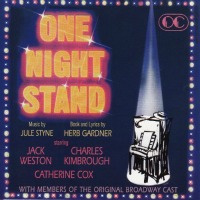 Original Broadway Cast, 1980 (Original Cast Records)
Original Broadway Cast, 1980 (Original Cast Records)  (3 / 5) From overture to finale, One Night Stand is as dynamic a score as Jule Styne ever wrote. But Herb Gardner proved to be inept as a librettist-lyricist in this, his one run-in with musical theater. The plot has possibilities — a famous performer decides to give one last concert, then kill himself onstage — but the lighthearted music is mismatched to it, and Gardner’s lyrics would be wrong in any situation. Styne crafted top-notch melodies for “Don’t Kick My Dreams Around,” “A Little Travelin’ Music, Please,” “There Was a Time,” and “Too Old to Be so Young.” There’s also a quartet of ingratiating leads in Charles Kimbrough, Catherine Cox, Jack Weston, and William Morrison, plus a great set of orchestrations by Philip J. Lang. This was the last of Styne’s Broadway scores to yield a cast album (Treasure Island and The Red Shoes followed, but both went unrecorded), so that’s reason enough to buy this one. — Seth Christenfeld
(3 / 5) From overture to finale, One Night Stand is as dynamic a score as Jule Styne ever wrote. But Herb Gardner proved to be inept as a librettist-lyricist in this, his one run-in with musical theater. The plot has possibilities — a famous performer decides to give one last concert, then kill himself onstage — but the lighthearted music is mismatched to it, and Gardner’s lyrics would be wrong in any situation. Styne crafted top-notch melodies for “Don’t Kick My Dreams Around,” “A Little Travelin’ Music, Please,” “There Was a Time,” and “Too Old to Be so Young.” There’s also a quartet of ingratiating leads in Charles Kimbrough, Catherine Cox, Jack Weston, and William Morrison, plus a great set of orchestrations by Philip J. Lang. This was the last of Styne’s Broadway scores to yield a cast album (Treasure Island and The Red Shoes followed, but both went unrecorded), so that’s reason enough to buy this one. — Seth Christenfeld
All posts by Michael Portantiere
One Mo’ Time
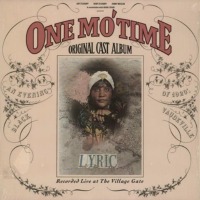 Original Off-Broadway Cast, 1980 (Warner Bros./no CD)
Original Off-Broadway Cast, 1980 (Warner Bros./no CD)  (3 / 5) Beginning in the late 1970s, the theater turned a nostalgic and admiring eye on the black musicals of earlier years — the imperishable songs, the raucous humor, the artists who triumphed in spite of dire conditions and Jim Crow laws. A number of revue-type shows celebrated black vaudevillians and their music; One Mo’ Time was set backstage at the fabled Lyric Theatre in New Orleans, circa 1926. The brainchild of writer-choreographer-costar Vernel Bagneris, the show had a tiny cast, a rudimentary plot, and a lot of exuberant music. It enjoyed a long run at New York’s Village Gate, where this live recording was made. The singers exude scrappy energy and an obvious love of the material, which includes “Miss Jenny’s Ball,” “Kiss Me Sweet,” and “Muddy Water.” Much of the music derives from Bessie Smith’s repertoire, including songs she wrote, so it makes sense to have a Smith-like character in the show. Unfortunately, Sylvia “Kuumba” Williams can’t touch the genuine article, and both she and Bagneris are out-sung by fellow cast members Topsy Chapman and Thais Clark. Veteran trumpeter-singer Jabbo Smith makes a guest appearance, performing more in the style of ’50s rhythm-and-blues than ’20s vaudeville. What’s most important, however, is the vitality and sincerity of all the performers as they pay homage to their predecessors. — Richard Barrios
(3 / 5) Beginning in the late 1970s, the theater turned a nostalgic and admiring eye on the black musicals of earlier years — the imperishable songs, the raucous humor, the artists who triumphed in spite of dire conditions and Jim Crow laws. A number of revue-type shows celebrated black vaudevillians and their music; One Mo’ Time was set backstage at the fabled Lyric Theatre in New Orleans, circa 1926. The brainchild of writer-choreographer-costar Vernel Bagneris, the show had a tiny cast, a rudimentary plot, and a lot of exuberant music. It enjoyed a long run at New York’s Village Gate, where this live recording was made. The singers exude scrappy energy and an obvious love of the material, which includes “Miss Jenny’s Ball,” “Kiss Me Sweet,” and “Muddy Water.” Much of the music derives from Bessie Smith’s repertoire, including songs she wrote, so it makes sense to have a Smith-like character in the show. Unfortunately, Sylvia “Kuumba” Williams can’t touch the genuine article, and both she and Bagneris are out-sung by fellow cast members Topsy Chapman and Thais Clark. Veteran trumpeter-singer Jabbo Smith makes a guest appearance, performing more in the style of ’50s rhythm-and-blues than ’20s vaudeville. What’s most important, however, is the vitality and sincerity of all the performers as they pay homage to their predecessors. — Richard Barrios
110 in the Shade
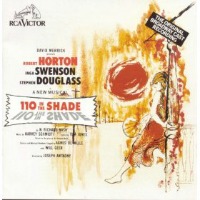 Original Broadway Cast, 1963 (RCA)
Original Broadway Cast, 1963 (RCA)  (3 / 5) 110 in the Shade is the Harvey Schmidt-Tom Jones musical based on N. Richard Nash’s The Rainmaker. As heard on this recording, the songs are replete with simple, folksy melodies and lyrics that evoke the story’s wide-open, Southwest setting, and they are enhanced by superb Hershy Kay orchestrations. But the conventionality of songs such as “Love, Don’t Turn Away” and “Is It Really Me?” prevents this score from being truly great. The album also reveals two of the leads to be underpowered: A certain coldness comes through in Inga Swenson’s portrayal of Lizzie Curry, and her vis-a-vis, Robert Horton, isn’t quite up to the considerable vocal demands of the rainmaking Starbuck. But Stephen Douglass, completing the triangle as File, is engaging, and teenager Lesley Ann Warren is delightful in her one song, squealing with high-school-girl naughtiness. The CD restores the previously unreleased overture, but it’s blaring and sloppily played. The original LP version of the album opened more appropriately with the scene-setting “Gonna Be Another Hot Day,” so here’s one case where a bonus track is actually a liability. — Marc Miller
(3 / 5) 110 in the Shade is the Harvey Schmidt-Tom Jones musical based on N. Richard Nash’s The Rainmaker. As heard on this recording, the songs are replete with simple, folksy melodies and lyrics that evoke the story’s wide-open, Southwest setting, and they are enhanced by superb Hershy Kay orchestrations. But the conventionality of songs such as “Love, Don’t Turn Away” and “Is It Really Me?” prevents this score from being truly great. The album also reveals two of the leads to be underpowered: A certain coldness comes through in Inga Swenson’s portrayal of Lizzie Curry, and her vis-a-vis, Robert Horton, isn’t quite up to the considerable vocal demands of the rainmaking Starbuck. But Stephen Douglass, completing the triangle as File, is engaging, and teenager Lesley Ann Warren is delightful in her one song, squealing with high-school-girl naughtiness. The CD restores the previously unreleased overture, but it’s blaring and sloppily played. The original LP version of the album opened more appropriately with the scene-setting “Gonna Be Another Hot Day,” so here’s one case where a bonus track is actually a liability. — Marc Miller
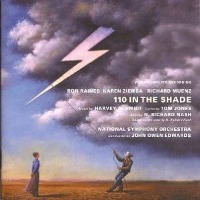 Studio Cast, 1997 (JAY, 2CDs)
Studio Cast, 1997 (JAY, 2CDs)  (3 / 5) Sumptuously produced, this complete recording of the score may be too inclusive. With John Owen Edwards conducting England’s National Symphony Orchestra, every note that was missing from the original Broadway album of 110 in the Shade is heard here, including a pointless soft-shoe interval in the already dull “Everything Beautiful Happens at Night.” An appendix offers a couple of songs that were cut from the show, and some other slightly rethought ones. But what this recording can rightfully boast over the original is a suitable Starbuck: Ron Raines is vocally velvety and a hell of an actor, capturing both this con man’s bluster and the self-doubting poet underneath. In the role of Lizzie, Karen Ziemba is persuasive as a plain woman terrified of becoming a spinster, but she’s somewhat insecure in her upper register — most noticeably when she sings the Act I finale, “Old Maid,” which should be a tour de force. Richard Muenz is fine as File, and the supporting cast is first-rate, particularly Kristin Chenoweth in the Lesley Ann Warren role. — M.M.
(3 / 5) Sumptuously produced, this complete recording of the score may be too inclusive. With John Owen Edwards conducting England’s National Symphony Orchestra, every note that was missing from the original Broadway album of 110 in the Shade is heard here, including a pointless soft-shoe interval in the already dull “Everything Beautiful Happens at Night.” An appendix offers a couple of songs that were cut from the show, and some other slightly rethought ones. But what this recording can rightfully boast over the original is a suitable Starbuck: Ron Raines is vocally velvety and a hell of an actor, capturing both this con man’s bluster and the self-doubting poet underneath. In the role of Lizzie, Karen Ziemba is persuasive as a plain woman terrified of becoming a spinster, but she’s somewhat insecure in her upper register — most noticeably when she sings the Act I finale, “Old Maid,” which should be a tour de force. Richard Muenz is fine as File, and the supporting cast is first-rate, particularly Kristin Chenoweth in the Lesley Ann Warren role. — M.M.
 Broadway Cast, 2007 (PS Classics)
Broadway Cast, 2007 (PS Classics)  (3 / 5) Audra McDonald had a go at 110 in 2007, under the auspices of the Roundabout Theatre Company. Hers is the best-acted, best-sung Lizzie I’ve ever heard; her terror in “Old Maid” and her yearning in “Simple Little Things” are palpable, and her vocalizing is sublime. However, this album isn’t an unmixed blessing: McDonald is saddled with a charisma-free Starbuck in Steve Kazee (though he does all right by “Melisande” and is helped somewhat by the inclusion of a cut song, “Evening Star”), and her File, Christopher Innvar, embodies this dull, dutiful character a bit too well. The new orchestrations, by Jonathan Tunick, sound skimpy. McDonald gets gentlemanly support from John Cullum as her father and Bobby Steggert as her brother Jimmy, and generous connecting dialog helps flesh out the narrative. — M.M.
(3 / 5) Audra McDonald had a go at 110 in 2007, under the auspices of the Roundabout Theatre Company. Hers is the best-acted, best-sung Lizzie I’ve ever heard; her terror in “Old Maid” and her yearning in “Simple Little Things” are palpable, and her vocalizing is sublime. However, this album isn’t an unmixed blessing: McDonald is saddled with a charisma-free Starbuck in Steve Kazee (though he does all right by “Melisande” and is helped somewhat by the inclusion of a cut song, “Evening Star”), and her File, Christopher Innvar, embodies this dull, dutiful character a bit too well. The new orchestrations, by Jonathan Tunick, sound skimpy. McDonald gets gentlemanly support from John Cullum as her father and Bobby Steggert as her brother Jimmy, and generous connecting dialog helps flesh out the narrative. — M.M.
Once Upon a Mattress
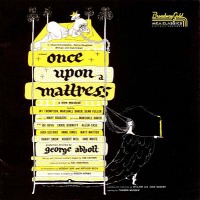 Original Broadway Cast, 1959 (Kapp/MCA)
Original Broadway Cast, 1959 (Kapp/MCA)  (5 / 5) The fairy tale source material is “The Princess and the Pea,” given a satirical fleshing-out. But Once Upon a Mattress was really a Cinderella show. Its composer was theatrical royalty: Mary Rodgers, daughter of Richard. Its lyricist, Marshall Barer, was unknown, and so was most of the cast. A big-league production team, led by director George Abbott, launched the show downtown, and it soon moved up to Broadway. The score is charming and funny by turns, but the show’s success hinged largely on its star. As Winnifred the Woebegone, Carol Burnett established herself as a strong singer and a peerless comic, and the proof is here on the recording. Burnett is fabulous as she caterwauls over “The Swamps of Home” or torches about wanting to be one of the lucky princesses who end up living “Happily Ever After.” The supporting cast is ideal: Joe Bova is an appealing Prince Dauntless; Jane White is the imperious Queen Aggravain; and Matt Mattox as the Jester does a fine job with one of the score’s best numbers, “Very Soft Shoes.” Apart from the necessary absence of Jack Gilford’s priceless mime performance as the mute king, there’s nothing at all amiss in this recording. Brava Burnett! — Richard Barrios
(5 / 5) The fairy tale source material is “The Princess and the Pea,” given a satirical fleshing-out. But Once Upon a Mattress was really a Cinderella show. Its composer was theatrical royalty: Mary Rodgers, daughter of Richard. Its lyricist, Marshall Barer, was unknown, and so was most of the cast. A big-league production team, led by director George Abbott, launched the show downtown, and it soon moved up to Broadway. The score is charming and funny by turns, but the show’s success hinged largely on its star. As Winnifred the Woebegone, Carol Burnett established herself as a strong singer and a peerless comic, and the proof is here on the recording. Burnett is fabulous as she caterwauls over “The Swamps of Home” or torches about wanting to be one of the lucky princesses who end up living “Happily Ever After.” The supporting cast is ideal: Joe Bova is an appealing Prince Dauntless; Jane White is the imperious Queen Aggravain; and Matt Mattox as the Jester does a fine job with one of the score’s best numbers, “Very Soft Shoes.” Apart from the necessary absence of Jack Gilford’s priceless mime performance as the mute king, there’s nothing at all amiss in this recording. Brava Burnett! — Richard Barrios
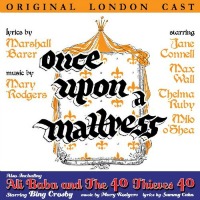 Original London Cast, 1960 (HMV/Sepia)
Original London Cast, 1960 (HMV/Sepia)  (3 / 5) Although Carol Burnett did not star in the West End production of Once Upon a Mattress, another funny American lady did. Jane Connell, who would later achieve musical theater immortality as Agnes Gooch in Mame, made a valiant stab at swimming Winnifred’s moat. Her performance on this cast album differs from Burnett’s; Connell shrieks where Burnett would bellow, and instead of inhabiting the role as her predecessor did, Connell comes through in her own way as a fine musical comedian. Otherwise, the London cast is quite equally matched with the American, and Patricia Lambert’s veddy British diction adds an extra layer of mock operetta charm to the role of Lady Larkin. The recording as a whole is slightly more decorous than the rather boisterously vaudevillian American original, but what matters most is that Once Upon a Mattress is a good enough show to work well either way. [Ed. Note: Sepia’s CD also includes Ali Baba and the 40 Thieves, a children’s record that features songs with music by Mary Rodgers and lyrics by Sammy Cahn.] — R.B.
(3 / 5) Although Carol Burnett did not star in the West End production of Once Upon a Mattress, another funny American lady did. Jane Connell, who would later achieve musical theater immortality as Agnes Gooch in Mame, made a valiant stab at swimming Winnifred’s moat. Her performance on this cast album differs from Burnett’s; Connell shrieks where Burnett would bellow, and instead of inhabiting the role as her predecessor did, Connell comes through in her own way as a fine musical comedian. Otherwise, the London cast is quite equally matched with the American, and Patricia Lambert’s veddy British diction adds an extra layer of mock operetta charm to the role of Lady Larkin. The recording as a whole is slightly more decorous than the rather boisterously vaudevillian American original, but what matters most is that Once Upon a Mattress is a good enough show to work well either way. [Ed. Note: Sepia’s CD also includes Ali Baba and the 40 Thieves, a children’s record that features songs with music by Mary Rodgers and lyrics by Sammy Cahn.] — R.B.
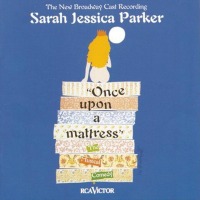 Broadway Cast, 1997 (RCA)
Broadway Cast, 1997 (RCA)  (1 / 5) After nearly four decades and two televised productions (both starring Carol Burnett), Mattress made it back to Broadway, albeit with drab results. Some of the show’s charm was still evident, but more conspicuous was the by-the-numbers aura that permeates the cast recording. Alas, Sarah Jessica Parker was not an apt choice for the heroine; although her musical theater experience dates back to Annie, and her Winnifred was Tony-nominated, she just doesn’t cut it. Setting aside the untouchable Burnett template, Parker can only manage to serve up makeshift vocalism and indifferent comic timing. The performances of the remainder of the cast, the chorus, and the orchestra are acceptable in a “Broadway generic” fashion, although Lawrence Clayton’s vocal tone is very thin in “Many Moons Ago.” The main virtue of this album is that it’s complete — including “The Minstrel, the Jester, and I,” a song that had not been recorded for the OBC album — but whose crummy idea was it to shoehorn a disco break into “The Spanish Panic?” Stick with Burnett and company. [Ed. Note: A third television production of Mattress, with Tracey Ullman as Winnifred and Burnett as Aggravain, aired in 2004 and is available on home video, but no soundtrack recording was released.] — R.B.
(1 / 5) After nearly four decades and two televised productions (both starring Carol Burnett), Mattress made it back to Broadway, albeit with drab results. Some of the show’s charm was still evident, but more conspicuous was the by-the-numbers aura that permeates the cast recording. Alas, Sarah Jessica Parker was not an apt choice for the heroine; although her musical theater experience dates back to Annie, and her Winnifred was Tony-nominated, she just doesn’t cut it. Setting aside the untouchable Burnett template, Parker can only manage to serve up makeshift vocalism and indifferent comic timing. The performances of the remainder of the cast, the chorus, and the orchestra are acceptable in a “Broadway generic” fashion, although Lawrence Clayton’s vocal tone is very thin in “Many Moons Ago.” The main virtue of this album is that it’s complete — including “The Minstrel, the Jester, and I,” a song that had not been recorded for the OBC album — but whose crummy idea was it to shoehorn a disco break into “The Spanish Panic?” Stick with Burnett and company. [Ed. Note: A third television production of Mattress, with Tracey Ullman as Winnifred and Burnett as Aggravain, aired in 2004 and is available on home video, but no soundtrack recording was released.] — R.B.
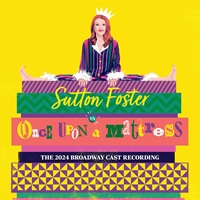 Broadway Cast, 2024 (Center Stage Records]
Broadway Cast, 2024 (Center Stage Records]  (4 / 5) The 2024 Broadway revival of this beloved show, a transfer from the New York City Center Encores! series, was a delight for its strong cast — headed by Sutton Foster as Princess Winnifred and Michael Urie as Prince Dauntless — as well as its generally laudable presentation of the great Mary Rodgers-Marshall Barer score. The cast album of that production is also highly enjoyable, despite a few relatively minor flaws. To get those out of the way: Some of Foster’s comic timing choices seem slightly misjudged for the recording medium; several of the other cast members occasionally veer towards overacting and over-singing, as compared to the more subtle performances heard on the original Broadway cast album; the tempo of the first ensemble number, “An Opening for a Princess,” is a bit too slow to create the excitement that’s wanted; and the new orchestrations, by Bruce Couglin, are fine as far as they go but not improvements on the originals. Also: While the melding of the characters of the Minstrel and the Jester to create one larger role, here beautifully sung by Daniel Breaker, works well enough for the most part, one sometimes misses the presence of a separate character and the extra voice, especially in the gorgeous song “Normandy.” Still, the whole enterprise is vastly more successful than the egregious 1997 Broadway production of Mattress. Foster, brilliantly partnered by Urie, has the best role of her career, and in addition to Breaker, there are worthy contributions by the happily cast Anna Gateyer as Queen Aggravain, Will Chase as Sir Harry, and Nikki Renée Daniels as Lady Larken. Brava to that last-named performer for perfecting the phrasing of Marshall Barer’s wonderfully clever interior rhyme “My time is at a premium for soon the world will see me a maternal bride to be” on the recording, which she failed to do in at least some live performances of the show. And thanks are due to all involved for proving to naysayers that this show is still eminently viable as an exemplar of expertly crafted, mid-20th century musical comedy — Michael Portantiere
(4 / 5) The 2024 Broadway revival of this beloved show, a transfer from the New York City Center Encores! series, was a delight for its strong cast — headed by Sutton Foster as Princess Winnifred and Michael Urie as Prince Dauntless — as well as its generally laudable presentation of the great Mary Rodgers-Marshall Barer score. The cast album of that production is also highly enjoyable, despite a few relatively minor flaws. To get those out of the way: Some of Foster’s comic timing choices seem slightly misjudged for the recording medium; several of the other cast members occasionally veer towards overacting and over-singing, as compared to the more subtle performances heard on the original Broadway cast album; the tempo of the first ensemble number, “An Opening for a Princess,” is a bit too slow to create the excitement that’s wanted; and the new orchestrations, by Bruce Couglin, are fine as far as they go but not improvements on the originals. Also: While the melding of the characters of the Minstrel and the Jester to create one larger role, here beautifully sung by Daniel Breaker, works well enough for the most part, one sometimes misses the presence of a separate character and the extra voice, especially in the gorgeous song “Normandy.” Still, the whole enterprise is vastly more successful than the egregious 1997 Broadway production of Mattress. Foster, brilliantly partnered by Urie, has the best role of her career, and in addition to Breaker, there are worthy contributions by the happily cast Anna Gateyer as Queen Aggravain, Will Chase as Sir Harry, and Nikki Renée Daniels as Lady Larken. Brava to that last-named performer for perfecting the phrasing of Marshall Barer’s wonderfully clever interior rhyme “My time is at a premium for soon the world will see me a maternal bride to be” on the recording, which she failed to do in at least some live performances of the show. And thanks are due to all involved for proving to naysayers that this show is still eminently viable as an exemplar of expertly crafted, mid-20th century musical comedy — Michael Portantiere
Once on This Island
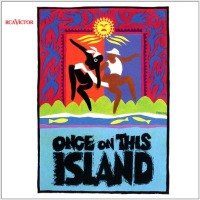 Original Broadway Cast, 1990 (RCA)
Original Broadway Cast, 1990 (RCA)  (4 / 5) One of the strongest works to date by lyricist Lynn Ahrens and composer Stephen Flaherty, Once on This Island is a juicy adaptation of the Rosa Guy novel My Love, My Love. The story, set in the Antilles: A young, dark-skinned peasant girl named Ti Moune rescues a wealthy Beauxhomme (a lighter-skinned product of mixed native and French stock) named Daniel from a car wreck, and offers her life to the gods in exchange for his. The tale is told with honesty, simplicity, and a wonderful musicality. From the opening number, in which the peasant storytellers explain their way of prayer (“We Dance”), through joyous moments (“Waiting for Life,” “Mama Will Provide”) and beautiful ballads (“Forever Yours,” “Some Girls”) to the jubilant finale (“Why We Tell the Story”), the songs are dramatically and emotionally acute. There’s only one exception: “The Human Heart” is bland and completely extraneous to the score. The rest of the songs are transporting and gorgeous, and Michael Starobin’s orchestrations are generally brilliant. Heading the strong cast are the shimmering LaChanze as Ti Moune; the romantic Jerry Dixon as Daniel; the enveloping Kecia Lewis-Evans as Asaka, Mother of the Earth; the menacing Eric Riley as Papa Ge, Demon of Death; and the charming Afi McClendon as Little Ti Moune. — Matthew Murray
(4 / 5) One of the strongest works to date by lyricist Lynn Ahrens and composer Stephen Flaherty, Once on This Island is a juicy adaptation of the Rosa Guy novel My Love, My Love. The story, set in the Antilles: A young, dark-skinned peasant girl named Ti Moune rescues a wealthy Beauxhomme (a lighter-skinned product of mixed native and French stock) named Daniel from a car wreck, and offers her life to the gods in exchange for his. The tale is told with honesty, simplicity, and a wonderful musicality. From the opening number, in which the peasant storytellers explain their way of prayer (“We Dance”), through joyous moments (“Waiting for Life,” “Mama Will Provide”) and beautiful ballads (“Forever Yours,” “Some Girls”) to the jubilant finale (“Why We Tell the Story”), the songs are dramatically and emotionally acute. There’s only one exception: “The Human Heart” is bland and completely extraneous to the score. The rest of the songs are transporting and gorgeous, and Michael Starobin’s orchestrations are generally brilliant. Heading the strong cast are the shimmering LaChanze as Ti Moune; the romantic Jerry Dixon as Daniel; the enveloping Kecia Lewis-Evans as Asaka, Mother of the Earth; the menacing Eric Riley as Papa Ge, Demon of Death; and the charming Afi McClendon as Little Ti Moune. — Matthew Murray
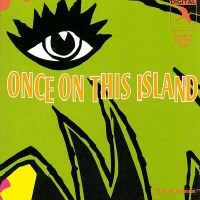 Original London Cast, 1994 (JAY)
Original London Cast, 1994 (JAY)  (3 / 5) This recording contains much the same material as the original Broadway album, but it lacks some of the freshness and magic that makes its predecessor so special. Lorna Brown’s Ti Moune is more serious and comes across as older and less energetic than LaChanze’s portrayal. Except for Monique Mason, who doesn’t sound up to the challenge of Little Ti Moune, the other performers are about on par with their Broadway counterparts. One misfire on the recording is a “special mix” of “The Human Heart,” sung by P. P. Arnold in a “pop” arrangement. Everything else here is perfectly enjoyable if never quite as exceptional as the Broadway cast album. — M.M.
(3 / 5) This recording contains much the same material as the original Broadway album, but it lacks some of the freshness and magic that makes its predecessor so special. Lorna Brown’s Ti Moune is more serious and comes across as older and less energetic than LaChanze’s portrayal. Except for Monique Mason, who doesn’t sound up to the challenge of Little Ti Moune, the other performers are about on par with their Broadway counterparts. One misfire on the recording is a “special mix” of “The Human Heart,” sung by P. P. Arnold in a “pop” arrangement. Everything else here is perfectly enjoyable if never quite as exceptional as the Broadway cast album. — M.M.
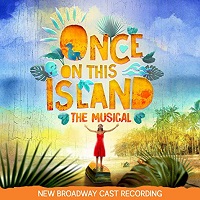 Broadway Cast, 2018 (Broadway Records)
Broadway Cast, 2018 (Broadway Records)  (4 / 5) The production that yielded this recording benefited greatly from its “environmental” and somewhat interactive staging at the Circle-in-the-Square theater, but it was also strong enough in its musical values that the cast album is a great pleasure to hear. A very young Hailey Kilgore is wonderful as Ti Moune, touching and emotionally vulnerable yet with a core of great strength, as required. Isaac Powell sounds dreamy in Daniel’s music, especially “Some Girls” and his part of “Forever Yours.” Other standouts are Quentin Earl Darrington as Agwe, Merle Dandridge as a female Pape Ge, Alex Newell as a roof-raising Asaka — and it sure is sweet and fun to have Lea Salonga, the original Kim in Miss Saigon, on hand as Erzulie. There are attractive new new orchestrations created by AnnMarie Milazzo, Haley Bennett and Javier Diaz, working with Michael Starobin’s originals. Fans of this score who have the original cast recording firmly imprinted on their brains may at first be slightly put off by some key changes for this one, but once you get used to that, it’s a thoroughly enjoyable listen. — Michael Portantiere
(4 / 5) The production that yielded this recording benefited greatly from its “environmental” and somewhat interactive staging at the Circle-in-the-Square theater, but it was also strong enough in its musical values that the cast album is a great pleasure to hear. A very young Hailey Kilgore is wonderful as Ti Moune, touching and emotionally vulnerable yet with a core of great strength, as required. Isaac Powell sounds dreamy in Daniel’s music, especially “Some Girls” and his part of “Forever Yours.” Other standouts are Quentin Earl Darrington as Agwe, Merle Dandridge as a female Pape Ge, Alex Newell as a roof-raising Asaka — and it sure is sweet and fun to have Lea Salonga, the original Kim in Miss Saigon, on hand as Erzulie. There are attractive new new orchestrations created by AnnMarie Milazzo, Haley Bennett and Javier Diaz, working with Michael Starobin’s originals. Fans of this score who have the original cast recording firmly imprinted on their brains may at first be slightly put off by some key changes for this one, but once you get used to that, it’s a thoroughly enjoyable listen. — Michael Portantiere
On a Clear Day You Can See Forever
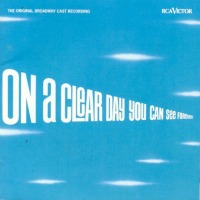 Original Broadway Cast, 1965 (RCA)
Original Broadway Cast, 1965 (RCA)  (5 / 5) This is a fabulous score. Alan Jay Lerner’s lyrics are among his wittiest and most poetic, while Burton Lane’s music is as melodic and moving as anything ever written for the stage. Although Lerner’s libretto for On a Clear Day You Can See Forever has been deemed problematic, the show’s songs have endured. Indeed, the title song became a standard. Robert Russell Bennett’s beautiful orchestrations were played by an augmented orchestra for this recording, masterfully conducted by Theodore Saidenburg. Barbara Harris is blissfully captured here in the dual-identity leading role: Daisy in the present, and Melinda in a past life that emerges under hypnosis administered by Dr. Mark Bruckner. In the latter part, John Cullum, with his strong, stalwart voice, has never sounded better than he does on this album. Particularly enjoyable are his renditions of “Come Back to Me,” “Melinda,” and the title song. William Daniels and Clifford David are also outstanding in supporting roles; Daniels’ deadpan delivery of “Wait Till We’re Sixty Five” makes this witty number a comic gem, while David does a beautiful job with the lovely ballad “She Wasn’t You.” The entire recording is a thrilling experience, from the magnificent fanfare that begins the overture to the spine-tingling finale in which the chorus joyfully sings “forever and ever and E-VER-MORE!” — Gerard Alessandrini
(5 / 5) This is a fabulous score. Alan Jay Lerner’s lyrics are among his wittiest and most poetic, while Burton Lane’s music is as melodic and moving as anything ever written for the stage. Although Lerner’s libretto for On a Clear Day You Can See Forever has been deemed problematic, the show’s songs have endured. Indeed, the title song became a standard. Robert Russell Bennett’s beautiful orchestrations were played by an augmented orchestra for this recording, masterfully conducted by Theodore Saidenburg. Barbara Harris is blissfully captured here in the dual-identity leading role: Daisy in the present, and Melinda in a past life that emerges under hypnosis administered by Dr. Mark Bruckner. In the latter part, John Cullum, with his strong, stalwart voice, has never sounded better than he does on this album. Particularly enjoyable are his renditions of “Come Back to Me,” “Melinda,” and the title song. William Daniels and Clifford David are also outstanding in supporting roles; Daniels’ deadpan delivery of “Wait Till We’re Sixty Five” makes this witty number a comic gem, while David does a beautiful job with the lovely ballad “She Wasn’t You.” The entire recording is a thrilling experience, from the magnificent fanfare that begins the overture to the spine-tingling finale in which the chorus joyfully sings “forever and ever and E-VER-MORE!” — Gerard Alessandrini
 Film Soundtrack, 1970 (Columbia)
Film Soundtrack, 1970 (Columbia)  (3 / 5) On a Clear Day was reconfigured as a film vehicle for Barbra Streisand, with mixed results. A good bit of the score remained intact, but some appealing songs are missing, such as the funny “Wait Till We’re Sixty Five” and the catchy “On the S.S. Bernard Cohn.” Also, Alan Jay Lerner’s original lyrics for “She Wasn’t You” were replaced; Burton Lane’s melody remains, but Lerner revamped the lyrics so that Streisand could sing the song as “He Isn’t You,” and the new version pales by comparison. While Streisand’s great voice and solid acting talent are well suited to the leading role(s), the film soundtrack is marred by the performance of co-star Yves Montand as the doctor, here named Marc Chabot. His singing on the album is not unpleasant, but his difficulties with the English language prevent him from communicating the nuances of Lerner’s ingenious lyrics; “Come Back to Me” suffers greatly in this respect. More bad news is that Nelson Riddle’s musical arrangements are not up to snuff. So, even though Streisand’s renditions of “Hurry, It’s Lovely Up Here,” “What Did I Have That I Don’t Have?” and the title song are among the best things she’s ever recorded, the soundtrack is less than terrific overall. — G.A.
(3 / 5) On a Clear Day was reconfigured as a film vehicle for Barbra Streisand, with mixed results. A good bit of the score remained intact, but some appealing songs are missing, such as the funny “Wait Till We’re Sixty Five” and the catchy “On the S.S. Bernard Cohn.” Also, Alan Jay Lerner’s original lyrics for “She Wasn’t You” were replaced; Burton Lane’s melody remains, but Lerner revamped the lyrics so that Streisand could sing the song as “He Isn’t You,” and the new version pales by comparison. While Streisand’s great voice and solid acting talent are well suited to the leading role(s), the film soundtrack is marred by the performance of co-star Yves Montand as the doctor, here named Marc Chabot. His singing on the album is not unpleasant, but his difficulties with the English language prevent him from communicating the nuances of Lerner’s ingenious lyrics; “Come Back to Me” suffers greatly in this respect. More bad news is that Nelson Riddle’s musical arrangements are not up to snuff. So, even though Streisand’s renditions of “Hurry, It’s Lovely Up Here,” “What Did I Have That I Don’t Have?” and the title song are among the best things she’s ever recorded, the soundtrack is less than terrific overall. — G.A.
Olympus on My Mind
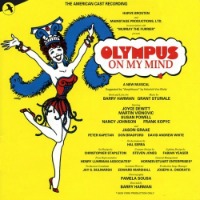 Off-Broadway Cast, 1987 (That’s Entertainment/JAY)
Off-Broadway Cast, 1987 (That’s Entertainment/JAY)  (2 / 5) During the opening number of this musical based on Amphitryon, as the three-man chorus sings “We are the chorus / Please don’t ignore us,” a woman suddenly joins them and adds, “My name’s Delores.” Played by Joyce DeWitt, she is the wife of the show’s principal backer, Murray the Furrier, and she’s here because he has promised her a role. Sweet but untalented, this ex-showgirl pops up throughout the show to help with numbers or exposition, always while modeling Murray’s furs. The joke is funny for a while, less so as Olympus on My Mind wears on. It distracts us from the main plot: the story of Jupiter, who comes to earth to win a beautiful woman by disguising himself as her husband, Amphitryon. In this version, Jupiter isn’t satisfied with bedding her; he wants her to love him. His son, Mercury, warns him that, on Earth, he will start feeling human emotions — and, sure enough, Jupiter begins to experience real pain. But as soon as we start caring about him, Delores is back with her shtick. The main plot, involving disguises and double identities, is reminiscent of The Boys From Syracuse, and much of it is well written and quite funny. The songs, by composer Grant Sturiale and lyricist Barry Harman, are prankish and playful. Among the best of them are “The Gods on Tap,” “Back So Soon,” “Wonderful,” “A Little Something of Yourself,” and “It Was Me!” In a strong cast consisting of performers from two separate Off-Broadway productions, Martin Vidnovic sings well as Jupiter and Amphitryon, Frank Copyk is a funny Sosia, and Jason Graae is a very spruce Mercury. — David Wolf
(2 / 5) During the opening number of this musical based on Amphitryon, as the three-man chorus sings “We are the chorus / Please don’t ignore us,” a woman suddenly joins them and adds, “My name’s Delores.” Played by Joyce DeWitt, she is the wife of the show’s principal backer, Murray the Furrier, and she’s here because he has promised her a role. Sweet but untalented, this ex-showgirl pops up throughout the show to help with numbers or exposition, always while modeling Murray’s furs. The joke is funny for a while, less so as Olympus on My Mind wears on. It distracts us from the main plot: the story of Jupiter, who comes to earth to win a beautiful woman by disguising himself as her husband, Amphitryon. In this version, Jupiter isn’t satisfied with bedding her; he wants her to love him. His son, Mercury, warns him that, on Earth, he will start feeling human emotions — and, sure enough, Jupiter begins to experience real pain. But as soon as we start caring about him, Delores is back with her shtick. The main plot, involving disguises and double identities, is reminiscent of The Boys From Syracuse, and much of it is well written and quite funny. The songs, by composer Grant Sturiale and lyricist Barry Harman, are prankish and playful. Among the best of them are “The Gods on Tap,” “Back So Soon,” “Wonderful,” “A Little Something of Yourself,” and “It Was Me!” In a strong cast consisting of performers from two separate Off-Broadway productions, Martin Vidnovic sings well as Jupiter and Amphitryon, Frank Copyk is a funny Sosia, and Jason Graae is a very spruce Mercury. — David Wolf
Oliver!
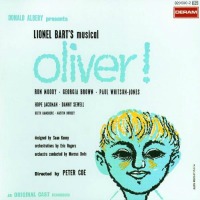 Original London Cast, 1960 (Decca/Deram)
Original London Cast, 1960 (Decca/Deram)  (4 / 5) This musical adaptation of Charles Dickens’ Oliver Twist was quite a phenomenon in its day, beginning as a modest, fringe-type production in London and becoming an international smash hit. The show boasted a melodic score by composer-lyricist-librettist Lionel Bart, innovative sets by Sean Kenny, fluid direction by Peter Coe, and orchestrations and arrangements that were simple, clear, and direct. The score includes such now-famous and beloved songs as “Food, Glorious Food,” “Where Is Love?,” “Consider Yourself,” “As Long as He Needs Me,” and “Who Will Buy?” On this cast recording, the legendary performance of Ron Moody as Fagin is vibrant and unforgettable. Georgia Brown makes the part of Nancy her own; her husky voice throbs with emotion, and she is entirely believable as a woman of the Victorian underworld. Her rendition of “As Long as He Needs Me” is definitive. Also excellent are Keith Hamshere as Oliver and Martin Horsey as the Artful Dodger. — Gerard Alessandini
(4 / 5) This musical adaptation of Charles Dickens’ Oliver Twist was quite a phenomenon in its day, beginning as a modest, fringe-type production in London and becoming an international smash hit. The show boasted a melodic score by composer-lyricist-librettist Lionel Bart, innovative sets by Sean Kenny, fluid direction by Peter Coe, and orchestrations and arrangements that were simple, clear, and direct. The score includes such now-famous and beloved songs as “Food, Glorious Food,” “Where Is Love?,” “Consider Yourself,” “As Long as He Needs Me,” and “Who Will Buy?” On this cast recording, the legendary performance of Ron Moody as Fagin is vibrant and unforgettable. Georgia Brown makes the part of Nancy her own; her husky voice throbs with emotion, and she is entirely believable as a woman of the Victorian underworld. Her rendition of “As Long as He Needs Me” is definitive. Also excellent are Keith Hamshere as Oliver and Martin Horsey as the Artful Dodger. — Gerard Alessandini
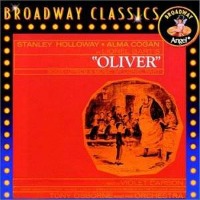 London Studio Cast, 1962 (Capitol/Angel)
London Studio Cast, 1962 (Capitol/Angel)  (2 / 5) On this recording, Stanley Holloway, famous for his portrayal of Alfred Doolittle in the original stage and film versions of My Fair Lady, is well cast as Fagin. In the role of Nancy, Alma Cogan, a popular cabaret singer of the 1960s, does a fine job belting out “Oom-Pah-Pah,” “It’s a Fine Life,” and a pop-style rendition of “As Long as He Needs Me.” Tony Tanner makes a fine Artful Dodger. Still, this comes across as less a cast recording than a “Songs from Oliver!” album. — G.A.
(2 / 5) On this recording, Stanley Holloway, famous for his portrayal of Alfred Doolittle in the original stage and film versions of My Fair Lady, is well cast as Fagin. In the role of Nancy, Alma Cogan, a popular cabaret singer of the 1960s, does a fine job belting out “Oom-Pah-Pah,” “It’s a Fine Life,” and a pop-style rendition of “As Long as He Needs Me.” Tony Tanner makes a fine Artful Dodger. Still, this comes across as less a cast recording than a “Songs from Oliver!” album. — G.A.
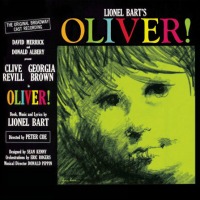 Original Broadway Cast, 1963 (RCA)
Original Broadway Cast, 1963 (RCA)  (3 / 5) Although Clive Revill gives a fine performance as Fagin on this recording, his characterization isn’t as colorful and eccentric as that of Ron Moody of the original London cast. But this album does have Georgia Brown recreating her landmark role of Nancy, as powerfully as ever. Bruce Prochnik sings well as Oliver, Michael Goodman is a fine Artful Dodger, and Willoughby Goddard is well cast as Mr. Bumble. With musical director Donald Pippin breathing new life into the score, the tempi are brighter than on the London album, although the earlier effort is fresher on the whole and more authentic in atmosphere. RCA’s “Living Stereo” sound is superior. An interesting note is that this recording was made in Los Angeles, where the show’s pre-Broadway tour began; by the time the production reached New York, Michael Goodman had been replaced as the Artful Dodger by David “Davy” Jones, who went on to become famous as one of The Monkees. — G.A.
(3 / 5) Although Clive Revill gives a fine performance as Fagin on this recording, his characterization isn’t as colorful and eccentric as that of Ron Moody of the original London cast. But this album does have Georgia Brown recreating her landmark role of Nancy, as powerfully as ever. Bruce Prochnik sings well as Oliver, Michael Goodman is a fine Artful Dodger, and Willoughby Goddard is well cast as Mr. Bumble. With musical director Donald Pippin breathing new life into the score, the tempi are brighter than on the London album, although the earlier effort is fresher on the whole and more authentic in atmosphere. RCA’s “Living Stereo” sound is superior. An interesting note is that this recording was made in Los Angeles, where the show’s pre-Broadway tour began; by the time the production reached New York, Michael Goodman had been replaced as the Artful Dodger by David “Davy” Jones, who went on to become famous as one of The Monkees. — G.A.
 Film Soundtrack, 1968 (Colgems/RCA)
Film Soundtrack, 1968 (Colgems/RCA)  (4 / 5) Earning six Academy Awards, including Best Picture, the film version of Oliver! was masterfully directed by Sir Carol Reed, with the grand score given a bigger-than-big-movie-musical treatment. Under the direction of maestro Johnny Green, the orchestrations and choral arrangements heard on the soundtrack recording are layered with counterpoint melodies, and the overall effect is appropriate to the alternating opulence and squalor of the story’s various settings. Lionel Bart’s songs stand up beautifully to the elaborate scoring, and the performances are as vivid as the orchestrations. At the forefront is Ron Moody, who here outdoes his own fine work as Fagin on the original London cast album. Equally excellent is Jack Wild as the Artful Dodger; with his charming Cockney accent, he offers the best account of the role on record. Shani Wallis sings with great warmth and conviction as Nancy, and Harry Secombe as Mr. Bumble displays a superb tenor that elevates the title song and “Boy for Sale” to classic level. The one off-note is Kathe Green (daughter of Johnny), who sounds a bit phony and overly sweet in her dubbing of Oliver’s songs for Mark Lester. — G.A.
(4 / 5) Earning six Academy Awards, including Best Picture, the film version of Oliver! was masterfully directed by Sir Carol Reed, with the grand score given a bigger-than-big-movie-musical treatment. Under the direction of maestro Johnny Green, the orchestrations and choral arrangements heard on the soundtrack recording are layered with counterpoint melodies, and the overall effect is appropriate to the alternating opulence and squalor of the story’s various settings. Lionel Bart’s songs stand up beautifully to the elaborate scoring, and the performances are as vivid as the orchestrations. At the forefront is Ron Moody, who here outdoes his own fine work as Fagin on the original London cast album. Equally excellent is Jack Wild as the Artful Dodger; with his charming Cockney accent, he offers the best account of the role on record. Shani Wallis sings with great warmth and conviction as Nancy, and Harry Secombe as Mr. Bumble displays a superb tenor that elevates the title song and “Boy for Sale” to classic level. The one off-note is Kathe Green (daughter of Johnny), who sounds a bit phony and overly sweet in her dubbing of Oliver’s songs for Mark Lester. — G.A.
 London Cast, 1994 (Angel)
London Cast, 1994 (Angel)  (3 / 5) A new production of Oliver! that combined the original version with elements of the film yielded this most complete aural document of the score. Many of the songs have additional verses not found on other recordings, and a lot of dialogue is included. But the new orchestrations by William David Brohn are heavy on the synthesizer, conjuring the 1990s rather than London of a century earlier. On the plus side, there is excellent musical direction by Martin Koch, and the cast is strong. Jonathan Pryce is a marvelous Fagin, Sally Dexter does a fine job as Nancy, and the Artful Dodger is well portrayed by Adam Searles. As Oliver, Gregory Bradley displays a lovely voice; indeed, his is the best vocal performance of the role in all of the recordings reviewed her. Sam Mendes directed this production, and Mathew Bourne did the musical staging. Although you can’t enjoy their imaginative work on the cast album, the CD packaging is loaded with pictures and extensive notes. Even better, the booklet contains all of the show’s lyrics. — G.A.
(3 / 5) A new production of Oliver! that combined the original version with elements of the film yielded this most complete aural document of the score. Many of the songs have additional verses not found on other recordings, and a lot of dialogue is included. But the new orchestrations by William David Brohn are heavy on the synthesizer, conjuring the 1990s rather than London of a century earlier. On the plus side, there is excellent musical direction by Martin Koch, and the cast is strong. Jonathan Pryce is a marvelous Fagin, Sally Dexter does a fine job as Nancy, and the Artful Dodger is well portrayed by Adam Searles. As Oliver, Gregory Bradley displays a lovely voice; indeed, his is the best vocal performance of the role in all of the recordings reviewed her. Sam Mendes directed this production, and Mathew Bourne did the musical staging. Although you can’t enjoy their imaginative work on the cast album, the CD packaging is loaded with pictures and extensive notes. Even better, the booklet contains all of the show’s lyrics. — G.A.
Oklahoma!
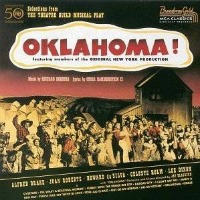 Original Broadway Cast, 1943 (Decca)
Original Broadway Cast, 1943 (Decca)  (5 / 5) This thrilling cast album of Rodgers & Hammerstein’s Oklahoma! score is the one, the only, the original that’s credited with starting it all. The show was a groundbreaking triumph in its day, and Decca pulled out all the stops to preserve its musical component; this was the first time a full score was recorded commercially by the entire original cast with the original orchestrations as heard in the theater. The album glories in such now-classic R&H songs as “Oh, What a Beautiful Mornin’,” “The Surrey With the Fringe on Top,” “Kansas City,” “People Will Say We’re in Love,” “Out of My Dreams,” and the exhilarating title tune, all delivered with enormous spirit and enthusiasm. In particular, the joyous performances of Alfred Drake as Curly and Celeste Holm as Ado Annie show us why these two stars launched major careers with this show. That said, there’s an antique quality to aspects of the recording that may be jarring; the performers’ enunciation is exaggerated as if for stage delivery, rather than being modified for the studio sessions, and the limitations of the era’s technology also make the orchestrations sound a bit squeaky. Still, this is, for all intents and purposes, the original original cast album. As such, it’s a must for any serious collector. Note: The two most recent editions of this classic album offer all of the songs from both Volumes I and II of the recording as released back in the 1940s, including “The Farmer and the Cowman,” “Lonely Room” (sung by Alfred Drake, not by Howard Da Silva, who originated the role of Jud), and a few other tracks from Volume II. Sadly missing, because it was not recorded at the time, is the music that accompanied the groundbreaking dream ballet “Laurey Makes Up Her Mind” as created and choreographed by the great Agnes de Mille. — Gerard Alessandrini
(5 / 5) This thrilling cast album of Rodgers & Hammerstein’s Oklahoma! score is the one, the only, the original that’s credited with starting it all. The show was a groundbreaking triumph in its day, and Decca pulled out all the stops to preserve its musical component; this was the first time a full score was recorded commercially by the entire original cast with the original orchestrations as heard in the theater. The album glories in such now-classic R&H songs as “Oh, What a Beautiful Mornin’,” “The Surrey With the Fringe on Top,” “Kansas City,” “People Will Say We’re in Love,” “Out of My Dreams,” and the exhilarating title tune, all delivered with enormous spirit and enthusiasm. In particular, the joyous performances of Alfred Drake as Curly and Celeste Holm as Ado Annie show us why these two stars launched major careers with this show. That said, there’s an antique quality to aspects of the recording that may be jarring; the performers’ enunciation is exaggerated as if for stage delivery, rather than being modified for the studio sessions, and the limitations of the era’s technology also make the orchestrations sound a bit squeaky. Still, this is, for all intents and purposes, the original original cast album. As such, it’s a must for any serious collector. Note: The two most recent editions of this classic album offer all of the songs from both Volumes I and II of the recording as released back in the 1940s, including “The Farmer and the Cowman,” “Lonely Room” (sung by Alfred Drake, not by Howard Da Silva, who originated the role of Jud), and a few other tracks from Volume II. Sadly missing, because it was not recorded at the time, is the music that accompanied the groundbreaking dream ballet “Laurey Makes Up Her Mind” as created and choreographed by the great Agnes de Mille. — Gerard Alessandrini
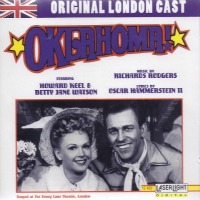 Original London Cast, 1947 (HMV/various CD labels)
Original London Cast, 1947 (HMV/various CD labels)  (2 / 5) The original London production of Oklahoma! was recorded in severely edited fashion, with the songs laid down as medleys on 78-rpm platters — four medleys of 12 songs. Curly is sung by Howard Keel (or, as he was billed at the time, Harold Keel), whose strong voice is immediately identifiable. Betty Jane Watson as Laurey sings very nicely until the last note of “People Will Say We’re in Love,” when she hits a high Q-sharp above P. The result is the screechiest soprano sound since Janet Leigh screamed bloody murder in Psycho. Because so much of the score is omitted, this album is worth hearing mainly to enjoy the baritone of the young Keel as recorded a few years before he became a star of M-G-M movie musicals. — G.A.
(2 / 5) The original London production of Oklahoma! was recorded in severely edited fashion, with the songs laid down as medleys on 78-rpm platters — four medleys of 12 songs. Curly is sung by Howard Keel (or, as he was billed at the time, Harold Keel), whose strong voice is immediately identifiable. Betty Jane Watson as Laurey sings very nicely until the last note of “People Will Say We’re in Love,” when she hits a high Q-sharp above P. The result is the screechiest soprano sound since Janet Leigh screamed bloody murder in Psycho. Because so much of the score is omitted, this album is worth hearing mainly to enjoy the baritone of the young Keel as recorded a few years before he became a star of M-G-M movie musicals. — G.A.
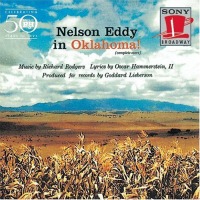 Studio Cast, 1952 (Columbia/Sony)
Studio Cast, 1952 (Columbia/Sony)  (3 / 5) Produced by Goddard Lieberson, this fine recording is conducted by Broadway maestro Lehman Engel. Hollywood singing star Nelson Eddy is Curly; his strong, beautiful voice is a natural for this romantic baritone role, but he may sound a bit too operatic and stodgy for some listeners. Kaye Ballard’s Ado Annie is a classic turn, her belt voice and comic genius making for one of the best recordings of “I Cain’t Say No.” Virginia Haskins is a lovely Laurey, the great Portia Nelson is on hand as Aunt Eller, and Wilton Clary rounds out the cast as Will Parker. With its high-fidelity sound, this album gives us a better sense of Robert Russell Bennett’s orchestrations than does the 1943 recording. While it’s far from the best aural document of Oklahoma! in sum, there is much to recommend it. — G.A.
(3 / 5) Produced by Goddard Lieberson, this fine recording is conducted by Broadway maestro Lehman Engel. Hollywood singing star Nelson Eddy is Curly; his strong, beautiful voice is a natural for this romantic baritone role, but he may sound a bit too operatic and stodgy for some listeners. Kaye Ballard’s Ado Annie is a classic turn, her belt voice and comic genius making for one of the best recordings of “I Cain’t Say No.” Virginia Haskins is a lovely Laurey, the great Portia Nelson is on hand as Aunt Eller, and Wilton Clary rounds out the cast as Will Parker. With its high-fidelity sound, this album gives us a better sense of Robert Russell Bennett’s orchestrations than does the 1943 recording. While it’s far from the best aural document of Oklahoma! in sum, there is much to recommend it. — G.A.
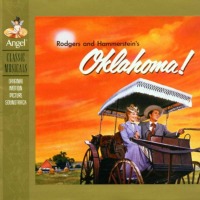 Film Soundtrack, 1955 (Capitol/Angel)
Film Soundtrack, 1955 (Capitol/Angel)  (5 / 5) Although the original Broadway cast album of Oklahoma! is a treasure, the film soundtrack recording is even more satisfying overall. Beautifully recorded in stereo, the score is even closer to complete here, and the performances remain unsurpassed. The singing of Gordon MacRae and Shirley Jones is magnificent; with their melodic voices and naturalistic diction, they offer perfect examples of how to deliver musical theater material. MacRae’s renditions of “Oh, What a Beautiful Mornin'” and “The Surrey With the Fringe on Top” are superb, while Jones’s singing in “People Will Say We’re in Love” and “Out of My Dreams” is breathtaking. Neither of their performances, nor those of Gloria Grahame as Ado Annie, Gene Nelson as Will Parker, and the rest of the cast, sound the least bit dated. The grand orchestrations are expanded from the Broadway originals and a bit Hollywoodized, but never overblown. Angel’s expanded CD contains two overtures and all of the film’s (and show’s) wonderful dance music, including the dream ballet. — G.A.
(5 / 5) Although the original Broadway cast album of Oklahoma! is a treasure, the film soundtrack recording is even more satisfying overall. Beautifully recorded in stereo, the score is even closer to complete here, and the performances remain unsurpassed. The singing of Gordon MacRae and Shirley Jones is magnificent; with their melodic voices and naturalistic diction, they offer perfect examples of how to deliver musical theater material. MacRae’s renditions of “Oh, What a Beautiful Mornin'” and “The Surrey With the Fringe on Top” are superb, while Jones’s singing in “People Will Say We’re in Love” and “Out of My Dreams” is breathtaking. Neither of their performances, nor those of Gloria Grahame as Ado Annie, Gene Nelson as Will Parker, and the rest of the cast, sound the least bit dated. The grand orchestrations are expanded from the Broadway originals and a bit Hollywoodized, but never overblown. Angel’s expanded CD contains two overtures and all of the film’s (and show’s) wonderful dance music, including the dream ballet. — G.A.
 Studio Cast, 1964 (Columbia/Masterworks Broadway)
Studio Cast, 1964 (Columbia/Masterworks Broadway)  (1 / 5) John Raitt did not create the role of Curly in Oklahoma! but he played it on tour. (Rodgers and Hammerstein liked Raitt so much that they cast him as Billy Bigelow in their next show, Carousel.) When Columbia decided in the mid 1960s to make a stereo studio recording of Oklahoma! starring Raitt, it sounded like a brilliant idea. Unfortunately, a “fresh approach” to the score was taken, and the results are fairly disastrous. Philip J. Lang created new, punched-up orchestrations that have a 1960s camp edge and are nowhere near as thrilling as the originals. Florence Henderson, who had played Laurey as a replacement on Broadway, is only adequate here; she might have come across better if the recording had been more faithful to the Broadway score. Phyllis Newman makes a fine, funny Ado Annie, but, again, her work is sabotaged by the arrangements and orchestrations. Some of the supporting performances are so twangy and Hillbilly-sounding that they’re hard to listen to. “Oh! What a Beautiful Mornin'” is the only commendable track on the album, because the orchestrations for this song are less phony sounding than the rest, allowing Raitt’s lovely interpretation to shine through. Still, on the whole, the recording sounds nothing like a theatrical performance and is a huge disappointment. — G.A.
(1 / 5) John Raitt did not create the role of Curly in Oklahoma! but he played it on tour. (Rodgers and Hammerstein liked Raitt so much that they cast him as Billy Bigelow in their next show, Carousel.) When Columbia decided in the mid 1960s to make a stereo studio recording of Oklahoma! starring Raitt, it sounded like a brilliant idea. Unfortunately, a “fresh approach” to the score was taken, and the results are fairly disastrous. Philip J. Lang created new, punched-up orchestrations that have a 1960s camp edge and are nowhere near as thrilling as the originals. Florence Henderson, who had played Laurey as a replacement on Broadway, is only adequate here; she might have come across better if the recording had been more faithful to the Broadway score. Phyllis Newman makes a fine, funny Ado Annie, but, again, her work is sabotaged by the arrangements and orchestrations. Some of the supporting performances are so twangy and Hillbilly-sounding that they’re hard to listen to. “Oh! What a Beautiful Mornin'” is the only commendable track on the album, because the orchestrations for this song are less phony sounding than the rest, allowing Raitt’s lovely interpretation to shine through. Still, on the whole, the recording sounds nothing like a theatrical performance and is a huge disappointment. — G.A.
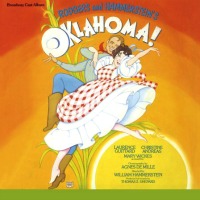 Broadway Cast, 1979 (RCA)
Broadway Cast, 1979 (RCA)  (3 / 5) Here’s a spirited performance led by Jay Blackton, conductor of the original Broadway production of Oklahoma! as well as the soundtrack score of the film version. The 1979 Broadway revival of the show that yielded this cast album was a hit, and the sound quality of the recording is excellent. Christine Andreas is full of warmth and pluck as Laurey, Mary Wickes is perfect as Aunt Eller, and Christine Ebersole is terrific as Ado Annie. The disappointment is that Laurence Guittard, although a fine singer, seems miscast as Curly. In fact, Martin Vidnovic as Jud sounds so much sexier than Guittard that you almost wish Laurey would leave Curly and run off with him! — G.A.
(3 / 5) Here’s a spirited performance led by Jay Blackton, conductor of the original Broadway production of Oklahoma! as well as the soundtrack score of the film version. The 1979 Broadway revival of the show that yielded this cast album was a hit, and the sound quality of the recording is excellent. Christine Andreas is full of warmth and pluck as Laurey, Mary Wickes is perfect as Aunt Eller, and Christine Ebersole is terrific as Ado Annie. The disappointment is that Laurence Guittard, although a fine singer, seems miscast as Curly. In fact, Martin Vidnovic as Jud sounds so much sexier than Guittard that you almost wish Laurey would leave Curly and run off with him! — G.A.
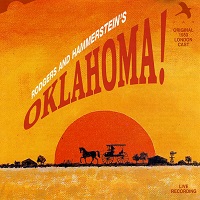 London Cast, 1980 (JAY)
London Cast, 1980 (JAY)  (2 / 5) Recorded live in performance with an audience — a rarity in the cast album sphere — this recording gains a certain excitement for that reason, undercut by the fact that most of the leading and featured vocal performances are unsatisfying in one respect or another. The best voice to be heard here is the rich, gorgeous baritone of male lead John Diedrich as Curly, but Diedrich’s quasi-operatic style of singing seems too affected for the role of this salt-of-the-earth cowpoke. In contrast, Rosamund Shelley as Laurey, Mark White as Will Parker, and Alfred Molina as Jud Fry all have voices that are not fully up to their assignments. For instance, Shelley sounds fine in “Many a New Day” until the end of the song, where she doesn’t; and Molina, who has since had a highly successful career on stage and screen, surprisingly fails to compensate in the acting department for his barely adequate singing of “Lonely Room.” On the plus side, Jillian Mack is a delightful, funny, charming Ado Annie with a good voice. The orchestrations seem to have been modeled on Robert Russell Bennett’s originals with a fair amount of unnecessary futzing, and the newly arranged overture is not an improvement, but the chorus sounds terrific in the title song and elsewhere. John Owen Edwards conducts the entire performance with skill and vigor. — Michael Portantiere
(2 / 5) Recorded live in performance with an audience — a rarity in the cast album sphere — this recording gains a certain excitement for that reason, undercut by the fact that most of the leading and featured vocal performances are unsatisfying in one respect or another. The best voice to be heard here is the rich, gorgeous baritone of male lead John Diedrich as Curly, but Diedrich’s quasi-operatic style of singing seems too affected for the role of this salt-of-the-earth cowpoke. In contrast, Rosamund Shelley as Laurey, Mark White as Will Parker, and Alfred Molina as Jud Fry all have voices that are not fully up to their assignments. For instance, Shelley sounds fine in “Many a New Day” until the end of the song, where she doesn’t; and Molina, who has since had a highly successful career on stage and screen, surprisingly fails to compensate in the acting department for his barely adequate singing of “Lonely Room.” On the plus side, Jillian Mack is a delightful, funny, charming Ado Annie with a good voice. The orchestrations seem to have been modeled on Robert Russell Bennett’s originals with a fair amount of unnecessary futzing, and the newly arranged overture is not an improvement, but the chorus sounds terrific in the title song and elsewhere. John Owen Edwards conducts the entire performance with skill and vigor. — Michael Portantiere
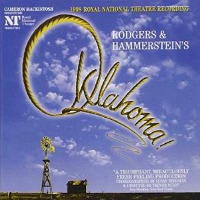 London Cast, 1998 (First Night)
London Cast, 1998 (First Night)  (4 / 5) Director Trevor Nunn’s acclaimed reinterpretation of this great American musical for London’s National Theatre brought forth elements of the Lynn Riggs play Green Grow the Lilacs, upon which Oklahoma! is based. Hugh Jackman may not sing with the beauty of Gordon MacRae, but he brings plenty of gusto and sex appeal to the role of Curly. Josefina Gabrielle was billed as the first woman ever to act, sing, and dance the part of Laurey, rather than yielding to a counterpart in the dream ballet. Of those three talents, her singing is the least impressive, but her delivery of Laurey’s songs doesn’t seriously compromise the recording. Maureen Lipman as Aunt Eller and Shuler Hensley as Jud Fry are both outstanding, the latter giving an emotionally complex, spine-tingling performance of “Lonely Room” that surpasses all other versions. The original orchestrations were revamped by William David Brohn to great effect, and David Krane created new dance music for the show’s stunning new choreography by Susan Stroman. — G.A.
(4 / 5) Director Trevor Nunn’s acclaimed reinterpretation of this great American musical for London’s National Theatre brought forth elements of the Lynn Riggs play Green Grow the Lilacs, upon which Oklahoma! is based. Hugh Jackman may not sing with the beauty of Gordon MacRae, but he brings plenty of gusto and sex appeal to the role of Curly. Josefina Gabrielle was billed as the first woman ever to act, sing, and dance the part of Laurey, rather than yielding to a counterpart in the dream ballet. Of those three talents, her singing is the least impressive, but her delivery of Laurey’s songs doesn’t seriously compromise the recording. Maureen Lipman as Aunt Eller and Shuler Hensley as Jud Fry are both outstanding, the latter giving an emotionally complex, spine-tingling performance of “Lonely Room” that surpasses all other versions. The original orchestrations were revamped by William David Brohn to great effect, and David Krane created new dance music for the show’s stunning new choreography by Susan Stroman. — G.A.
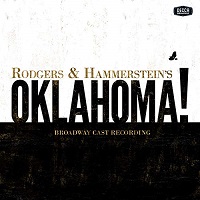 Broadway Cast, 2019 (Verve-Decca Broadway)
Broadway Cast, 2019 (Verve-Decca Broadway)  (1 / 5) Daniel Fish directed the radically reinterpreted production of Oklahoma! that yielded this recording, and in so doing, he largely contradicted the tone, spirit, and worldview set forth by the show’s creators. Yet the disrespectful elements of this revisal were mostly limited to the staging, the choreography, and the direction of the actors — for example, the implication of a homoerotic attraction between Curly and Jud, the addition of a sex act (not seen, but clearly heard in darkness ) between Jud and Laurey, and the murder of Jud by Curly in cold blood. Meanwhile, the adaptation and performance of the score were quite well done and pleasing overall, with the major exception of the dream ballet (see below). For the most part, Daniel Kluger skillfully re-orchestrated the classic R&H songs for a country-style band and, with some help from Nathan Koci, effectively rearranged the choruses for a singing ensemble much smaller than what would be heard in a traditional presentation of this score. Two of the lead singers are standouts: Damon Daunno is a warm, sexy, pleasantly yodeling Curly, and Ali Stroker a high-spirited, country-belting Ado Annie. Also very listenable are James Davis’s appealing Will Parker and Patrick Vail’s damaged yet empathetic Jud. But Rebecca Naomi Jones is unpleasant to hear in most of Laurey’s music, especially when required to sing way above her natural alto range due to someone’s strange decision not to lower the keys of certain songs far enough for her comfort — and even where the keys have been transposed to fit Jones’s range, she still dissatisfies because her vocal timbre is so ill-suited to the role. Her performance and the destructive, wholesale rearrangement of the music for the dream ballet (here dominated by “fuzz guitar”) drag this recording down from the higher estimation it would otherwise have received. — M.P.
(1 / 5) Daniel Fish directed the radically reinterpreted production of Oklahoma! that yielded this recording, and in so doing, he largely contradicted the tone, spirit, and worldview set forth by the show’s creators. Yet the disrespectful elements of this revisal were mostly limited to the staging, the choreography, and the direction of the actors — for example, the implication of a homoerotic attraction between Curly and Jud, the addition of a sex act (not seen, but clearly heard in darkness ) between Jud and Laurey, and the murder of Jud by Curly in cold blood. Meanwhile, the adaptation and performance of the score were quite well done and pleasing overall, with the major exception of the dream ballet (see below). For the most part, Daniel Kluger skillfully re-orchestrated the classic R&H songs for a country-style band and, with some help from Nathan Koci, effectively rearranged the choruses for a singing ensemble much smaller than what would be heard in a traditional presentation of this score. Two of the lead singers are standouts: Damon Daunno is a warm, sexy, pleasantly yodeling Curly, and Ali Stroker a high-spirited, country-belting Ado Annie. Also very listenable are James Davis’s appealing Will Parker and Patrick Vail’s damaged yet empathetic Jud. But Rebecca Naomi Jones is unpleasant to hear in most of Laurey’s music, especially when required to sing way above her natural alto range due to someone’s strange decision not to lower the keys of certain songs far enough for her comfort — and even where the keys have been transposed to fit Jones’s range, she still dissatisfies because her vocal timbre is so ill-suited to the role. Her performance and the destructive, wholesale rearrangement of the music for the dream ballet (here dominated by “fuzz guitar”) drag this recording down from the higher estimation it would otherwise have received. — M.P.
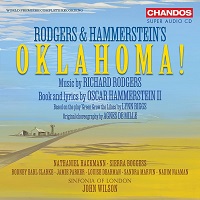 Studio Cast, 2023 (Chandos, 2CDs)
Studio Cast, 2023 (Chandos, 2CDs)  (5 / 5) Almost as if to serve as a counterweight — some might say an antidote — to the 2019 Broadway cast album of Oklahoma! reviewed above (and the tremendously off-putting production that it represents), this beautiful recording appeared in 2023. Chief among its virtues is the fact that it offers a note-complete presentation of the classic Rodgers & Hammerstein score. For example, both of the show’s extended dance music sequences, “Many a New Day” and the dream ballet “Laurey Makes Up Her Mind,” are heard here in full and in their original orchestrations for the first time on an audio recording. John Wilson does a superb job of leading the Sinfonia of London, conducting with obvious love and respect for the score, and all of the tempi he sets seem exactly right. The singers are also first-rate and perfectly cast, from the golden-voiced Nathaniel Hackmann and Sierra Boggess as Curly and Laurey to the comically charming Jamie Parker and Louise Dearman as Will Parker and Ado Annie. Rodney Earle Clarke gives a moving rendition of Jud Fry’s tortured confessional “Lonely Room”; brief but entertaining character portraits are offered by Sandra Marvin as Aunt Eller, Nadim Naaman as Ali Hakin, and Leo Roberts as Andrew Carnes; and the chorus and orchestra perform to the highest standards. So, what’s not to love about this album? Nothing whatsoever. — M.P.
(5 / 5) Almost as if to serve as a counterweight — some might say an antidote — to the 2019 Broadway cast album of Oklahoma! reviewed above (and the tremendously off-putting production that it represents), this beautiful recording appeared in 2023. Chief among its virtues is the fact that it offers a note-complete presentation of the classic Rodgers & Hammerstein score. For example, both of the show’s extended dance music sequences, “Many a New Day” and the dream ballet “Laurey Makes Up Her Mind,” are heard here in full and in their original orchestrations for the first time on an audio recording. John Wilson does a superb job of leading the Sinfonia of London, conducting with obvious love and respect for the score, and all of the tempi he sets seem exactly right. The singers are also first-rate and perfectly cast, from the golden-voiced Nathaniel Hackmann and Sierra Boggess as Curly and Laurey to the comically charming Jamie Parker and Louise Dearman as Will Parker and Ado Annie. Rodney Earle Clarke gives a moving rendition of Jud Fry’s tortured confessional “Lonely Room”; brief but entertaining character portraits are offered by Sandra Marvin as Aunt Eller, Nadim Naaman as Ali Hakin, and Leo Roberts as Andrew Carnes; and the chorus and orchestra perform to the highest standards. So, what’s not to love about this album? Nothing whatsoever. — M.P.
Oil City Symphony
 Original Off-Broadway Cast, 1988 (DRG)
Original Off-Broadway Cast, 1988 (DRG)  (2 / 5) Here is one of the most disappointing cast albums ever made in that it utterly fails to capture the hilarity of this show. Oil City Symphony was a straight-faced send-up of small-town musical programs, with a cast/creative team that consisted of Mike Craver, Debra Monk, Mark Hardwick, and Mary Murfitt. The show’s great appeal lay in the ingenuous earnestness of a group of people trying their best to present a concert in their decorated high school gymnasium, but goofing up — rather than measuring up — all along the way. Oil City was performed with no winking and no irony, and after each performance, lemonade and cookies were served in the lobby by the smiling cast. The score features new songs by the creative team, along with ringers such as “Baby, It’s Cold Outside,” “Dizzy Fingers,” and “Stars and Stripes Forever.” One interpolation was Ernest Gold’s “The Exodus Song,” for which Monk, a vision of ex-debutante propriety, played the drums with a vengeance. She really whacked the bejesus out of that trap set, unleashing what seemed to be a millennium’s worth of pent-up frustration. It was uproarious. Other songs were touching and charming, always presented in character. Oil City Symphony was the funniest musical revue of its time, but admittedly, it would have been very difficult to preserve its brilliance in an audio-only recording, and this album does not succeed in doing so. — Ken Bloom
(2 / 5) Here is one of the most disappointing cast albums ever made in that it utterly fails to capture the hilarity of this show. Oil City Symphony was a straight-faced send-up of small-town musical programs, with a cast/creative team that consisted of Mike Craver, Debra Monk, Mark Hardwick, and Mary Murfitt. The show’s great appeal lay in the ingenuous earnestness of a group of people trying their best to present a concert in their decorated high school gymnasium, but goofing up — rather than measuring up — all along the way. Oil City was performed with no winking and no irony, and after each performance, lemonade and cookies were served in the lobby by the smiling cast. The score features new songs by the creative team, along with ringers such as “Baby, It’s Cold Outside,” “Dizzy Fingers,” and “Stars and Stripes Forever.” One interpolation was Ernest Gold’s “The Exodus Song,” for which Monk, a vision of ex-debutante propriety, played the drums with a vengeance. She really whacked the bejesus out of that trap set, unleashing what seemed to be a millennium’s worth of pent-up frustration. It was uproarious. Other songs were touching and charming, always presented in character. Oil City Symphony was the funniest musical revue of its time, but admittedly, it would have been very difficult to preserve its brilliance in an audio-only recording, and this album does not succeed in doing so. — Ken Bloom
Oh! What a Lovely War
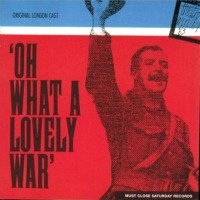 Original London Cast, 1963 (Decca/Must Close Saturday)
Original London Cast, 1963 (Decca/Must Close Saturday)  (4 / 5) A hit in London, a flop d’estime on Broadway, and the basis of a very odd film, Oh! What a Lovely War was a show that slotted vintage World War I tunes amid sketches/vignettes while the names of battles and numbers of war dead rolled by on an upstage flashing-lights billboard. Directed by Joan Littlewood, the show was billed as a “musical entertainment,” but the material can be quite upsetting. This recording captures its essence to strong effect with lengthy sequences of the score and dialogue. Many of the tunes are familiar, but some of them are outfitted with special wartime lyrics. The numbers are alternately sardonic (a postwar parody of the famous Kern song “They Wouldn’t Believe Me”), amusing (the saucy “Hitchy-Koo,” the recruiting song “I’ll Make a Man of You”), and moving (Ivor Novello’s “Keep the Home Fires Burning,” beautifully sung by Myvinwy Jenn). A particularly poignant sequence takes place on Christmas Eve in a trench, as English soldiers make temporary peace with German soldiers; it concludes with Victor Spinetti as an emcee leading a lighthearted “Goodbye-ee” that fades into sounds of distant gunfire. — Jeffrey Dunn
(4 / 5) A hit in London, a flop d’estime on Broadway, and the basis of a very odd film, Oh! What a Lovely War was a show that slotted vintage World War I tunes amid sketches/vignettes while the names of battles and numbers of war dead rolled by on an upstage flashing-lights billboard. Directed by Joan Littlewood, the show was billed as a “musical entertainment,” but the material can be quite upsetting. This recording captures its essence to strong effect with lengthy sequences of the score and dialogue. Many of the tunes are familiar, but some of them are outfitted with special wartime lyrics. The numbers are alternately sardonic (a postwar parody of the famous Kern song “They Wouldn’t Believe Me”), amusing (the saucy “Hitchy-Koo,” the recruiting song “I’ll Make a Man of You”), and moving (Ivor Novello’s “Keep the Home Fires Burning,” beautifully sung by Myvinwy Jenn). A particularly poignant sequence takes place on Christmas Eve in a trench, as English soldiers make temporary peace with German soldiers; it concludes with Victor Spinetti as an emcee leading a lighthearted “Goodbye-ee” that fades into sounds of distant gunfire. — Jeffrey Dunn
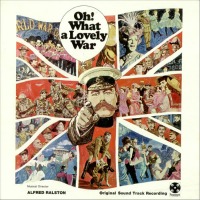 Film Soundtrack, 1969 (Paramount/no CD)
Film Soundtrack, 1969 (Paramount/no CD)  (2 / 5) Directed by Richard Attenborough, the film version of Oh! What a Lovely War found its own way to interpret the kaleidoscope of scenes and songs from the dazzling stage show. Unlike the London cast album, which includes a lot of dialogue, the soundtrack LP has only the songs. Some of them are given big, Hollywood-style orchestrations, others are arranged and performed more atmospherically, and there are also some medleys and instrumental tracks. “Belgium Put the Kibosh on the Kaiser” is charmingly sung by Jean-Pierre Cassel. In a recruiting sequence, Peggy Allen lends her bland soprano to “We Don’t Want to Lose You,” but then Maggie Smith takes over and grabs our attention with “I’ll Make a Man of You.” Smith has a commanding belt that will surprise listeners; her performance alone makes the soundtrack album noteworthy. Most of the other singing is lacking in personality, and because the songs are heard completely out of context, they aren’t as heartbreaking as they are on the stage cast album. — J.D.
(2 / 5) Directed by Richard Attenborough, the film version of Oh! What a Lovely War found its own way to interpret the kaleidoscope of scenes and songs from the dazzling stage show. Unlike the London cast album, which includes a lot of dialogue, the soundtrack LP has only the songs. Some of them are given big, Hollywood-style orchestrations, others are arranged and performed more atmospherically, and there are also some medleys and instrumental tracks. “Belgium Put the Kibosh on the Kaiser” is charmingly sung by Jean-Pierre Cassel. In a recruiting sequence, Peggy Allen lends her bland soprano to “We Don’t Want to Lose You,” but then Maggie Smith takes over and grabs our attention with “I’ll Make a Man of You.” Smith has a commanding belt that will surprise listeners; her performance alone makes the soundtrack album noteworthy. Most of the other singing is lacking in personality, and because the songs are heard completely out of context, they aren’t as heartbreaking as they are on the stage cast album. — J.D.
Oh, Kay!
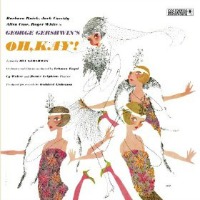 Studio Cast, 1955 (Columbia/Sony)
Studio Cast, 1955 (Columbia/Sony)  (2 / 5) With a score by George and Ira Gershwin, and a book by Guy Bolton and P. G. Wodehouse, this 1926 lark is a tuneful jaunt through the then-familiar territory of Long Island rum running, society marriages, and mistaken identities. The first attempt to set the score down intact was this recording, produced by Goddard Lieberson and conducted by Lehman Engel. Unlike some other titles in Columbia’s 1950s series of studio recordings of significant shows, Oh, Kay! at least preserves the period sound of the score, with twin pianos and a Grapelli-like jazz violin. But the sluggish tempi and the casting don’t do these nimble songs justice. Barbara Ruick is a sweet Kay, and her “Someone to Watch Over Me” is heartfelt if glacially slow, but her cooing soprano lacks variation. Jack Cassidy, always perfect as a shallow cad, doesn’t sound like he’s kidding his own oiliness here; he just sounds oily. The comic numbers assigned to Allen Case call not for voice, but for personality, and Case seems to have left his outside the studio. The recording also suffers from having one of those annoying greatest-hits finales tacked on. It all makes for easy listening, but the slow tempi dominate, so much so that the whole thing seems to have been wrapped up in slipcovers. The remastered CD features a few bonus tracks: Mary Martin singing “Maybe,” and two dizzy-fingers piano displays by George Gershwin. — Marc Miller
(2 / 5) With a score by George and Ira Gershwin, and a book by Guy Bolton and P. G. Wodehouse, this 1926 lark is a tuneful jaunt through the then-familiar territory of Long Island rum running, society marriages, and mistaken identities. The first attempt to set the score down intact was this recording, produced by Goddard Lieberson and conducted by Lehman Engel. Unlike some other titles in Columbia’s 1950s series of studio recordings of significant shows, Oh, Kay! at least preserves the period sound of the score, with twin pianos and a Grapelli-like jazz violin. But the sluggish tempi and the casting don’t do these nimble songs justice. Barbara Ruick is a sweet Kay, and her “Someone to Watch Over Me” is heartfelt if glacially slow, but her cooing soprano lacks variation. Jack Cassidy, always perfect as a shallow cad, doesn’t sound like he’s kidding his own oiliness here; he just sounds oily. The comic numbers assigned to Allen Case call not for voice, but for personality, and Case seems to have left his outside the studio. The recording also suffers from having one of those annoying greatest-hits finales tacked on. It all makes for easy listening, but the slow tempi dominate, so much so that the whole thing seems to have been wrapped up in slipcovers. The remastered CD features a few bonus tracks: Mary Martin singing “Maybe,” and two dizzy-fingers piano displays by George Gershwin. — Marc Miller
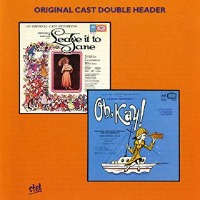 Off-Broadway Cast, 1960 (20th Century-Fox/Stet)
Off-Broadway Cast, 1960 (20th Century-Fox/Stet)  (1 / 5) When Stet picked up the rights to this long-forgotten revival cast album, it plastered the names of cast members Linda Lavin and Penny Fuller in big block letters on the cover, despite the fact that both were merely members of the chorus. On the other hand, Eddie Phillips, who has two big numbers, isn’t billed at all. There are missing songs, interpolations from other scores, and new, slapdash lyrics by Wodehouse; “You’ll Still Be There,” originally “Dear Little Girl,” doesn’t even scan neatly. The snatches of dialogue included here show a certain patronizing attitude toward the material, as if to say: “Look, it’s 1960 and we’re much smarter now!” The arrangements for an anorexic combo are cutesy, and the cast is uneven. David Daniels, with his solid baritone, is a fine Jimmy, but his Kay, Marti Stevens, drifts in and out of her Mayfair accent. She also has the odd habit of speaking whole verses of her lyrics, though not for any lack of singing ability. The recording is over in 36 minutes, and Gershwin’s melodic magic does survive the mishandling. It’s okay, but it’s not Oh, Kay! (The CD also includes selections from Leave It to Jane.) — M.M.
(1 / 5) When Stet picked up the rights to this long-forgotten revival cast album, it plastered the names of cast members Linda Lavin and Penny Fuller in big block letters on the cover, despite the fact that both were merely members of the chorus. On the other hand, Eddie Phillips, who has two big numbers, isn’t billed at all. There are missing songs, interpolations from other scores, and new, slapdash lyrics by Wodehouse; “You’ll Still Be There,” originally “Dear Little Girl,” doesn’t even scan neatly. The snatches of dialogue included here show a certain patronizing attitude toward the material, as if to say: “Look, it’s 1960 and we’re much smarter now!” The arrangements for an anorexic combo are cutesy, and the cast is uneven. David Daniels, with his solid baritone, is a fine Jimmy, but his Kay, Marti Stevens, drifts in and out of her Mayfair accent. She also has the odd habit of speaking whole verses of her lyrics, though not for any lack of singing ability. The recording is over in 36 minutes, and Gershwin’s melodic magic does survive the mishandling. It’s okay, but it’s not Oh, Kay! (The CD also includes selections from Leave It to Jane.) — M.M.
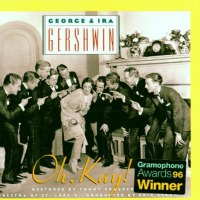 Studio Cast, 1995 (Nonesuch)
Studio Cast, 1995 (Nonesuch)  (5 / 5) A sheer delight, this reconstruction of Oh, Kay! takes certain liberties: It has new orchestrations by Russell Warner, some of the songs are re-sequenced, and some cut material has been restored. Still, the recording is utterly faithful to its Jazz Age heritage. Dawn Upshaw’s Kay is fervent, girlish, whimsical, and miles away from the opera-house haughtiness that sometimes is displayed when crossover artists attempt the Great American Songbook. Her “Someone to Watch Over Me” is melting and persuasive, her “Maybe” is pensive and touching, and her general command of musical theater vernacular is total. Similarly, Kurt Ollmann’s Jimmy is no opera snob slumming on Broadway; rather, he’s a chipper juvenile with a lot of voice. In other roles, Robert Westenberg, Liz Larsen, and Patrick Cassidy (who rips through “Fidgety Feet”) are stylistically perfect. There are some fun surprises, too: Susan Lucci pouts amusingly as Jimmy’s bitchy fiancee, and Fritz Weaver bloviates entertainingly as her pompous pater. Eric Stern’s 23-piece orchestra is just the right size for this score and has a clean, unaffected sound. Kevin Cole and Joseph Thalken tear irresistibly through some twin-piano arrangements. The handsome CD booklet contains informative, engaging notes by Lee Davis, producer Tommy Krasker, and Evan Ross. — M.M.
(5 / 5) A sheer delight, this reconstruction of Oh, Kay! takes certain liberties: It has new orchestrations by Russell Warner, some of the songs are re-sequenced, and some cut material has been restored. Still, the recording is utterly faithful to its Jazz Age heritage. Dawn Upshaw’s Kay is fervent, girlish, whimsical, and miles away from the opera-house haughtiness that sometimes is displayed when crossover artists attempt the Great American Songbook. Her “Someone to Watch Over Me” is melting and persuasive, her “Maybe” is pensive and touching, and her general command of musical theater vernacular is total. Similarly, Kurt Ollmann’s Jimmy is no opera snob slumming on Broadway; rather, he’s a chipper juvenile with a lot of voice. In other roles, Robert Westenberg, Liz Larsen, and Patrick Cassidy (who rips through “Fidgety Feet”) are stylistically perfect. There are some fun surprises, too: Susan Lucci pouts amusingly as Jimmy’s bitchy fiancee, and Fritz Weaver bloviates entertainingly as her pompous pater. Eric Stern’s 23-piece orchestra is just the right size for this score and has a clean, unaffected sound. Kevin Cole and Joseph Thalken tear irresistibly through some twin-piano arrangements. The handsome CD booklet contains informative, engaging notes by Lee Davis, producer Tommy Krasker, and Evan Ross. — M.M.
Oh Coward!
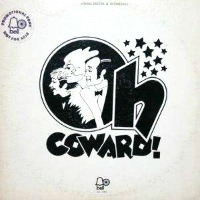 Original Off-Broadway Cast, 1972 (Bell/no CD)
Original Off-Broadway Cast, 1972 (Bell/no CD)  (4 / 5) After appearing in Noël Coward’s last musical, The Girl Who Came to Supper, Roderick Cook compiled a revue of Coward’s songs that was first produced as Noël Coward’s Sweet Potato, a quick Broadway flop in 1968. Cook tried subsequent assemblages of Coward material in different cities with different titles, and finally returned to New York with Oh Coward! The revue enjoyed a successful Off-Broadway run. Coward’s songs — and excerpts from his verse, plays, and memoirs, which serve as linking narration — are delightfully entertaining as presented here. No one ever wrote comic songs like this fellow; he chose his words with specificity, using them with precision and a demented logic. When Coward turned serious, his work was almost as impressive, if not so unique. He is well served in Oh Coward! by the layout of the material (roughly according to subject), and also by the three-member cast: Cook and comic actress Barbara Cason are very effective, and Jamie Ross is an only slightly weaker link. — David Wolf
(4 / 5) After appearing in Noël Coward’s last musical, The Girl Who Came to Supper, Roderick Cook compiled a revue of Coward’s songs that was first produced as Noël Coward’s Sweet Potato, a quick Broadway flop in 1968. Cook tried subsequent assemblages of Coward material in different cities with different titles, and finally returned to New York with Oh Coward! The revue enjoyed a successful Off-Broadway run. Coward’s songs — and excerpts from his verse, plays, and memoirs, which serve as linking narration — are delightfully entertaining as presented here. No one ever wrote comic songs like this fellow; he chose his words with specificity, using them with precision and a demented logic. When Coward turned serious, his work was almost as impressive, if not so unique. He is well served in Oh Coward! by the layout of the material (roughly according to subject), and also by the three-member cast: Cook and comic actress Barbara Cason are very effective, and Jamie Ross is an only slightly weaker link. — David Wolf
Oh Captain!
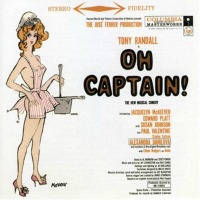 Original Broadway Cast, 1958 (Columbia/DRG)
Original Broadway Cast, 1958 (Columbia/DRG)  (4 / 5) For their Broadway songwriting debut, the Hollywood team of Jay Livingston and Ray Evans freely adapted/the British film The Captain’s Paradise and did outstanding work. Here is a full, integrated score that nimbly tells the story of a sea captain (Tony Randall) with a prim English wife (Jacquelyn McKeever) just outside London and a sizzling French mistress (Eileen Rodgers) in Paris. True, some of the lyrics snicker sophomorically about sex or contort themselves wildly to rhyme (“This report is special on / How I achieve my echelon”). But consider the compensations: a tuneful, generally clever set of songs with one hit (“All the Time”) and some other fine writing (“You Don’t Know Him,” “Surprise”), plus a supercharged atmosphere and game principal performances. The supporting cast is strong, too: Edward Platt reveals a sturdy bass-baritone in the lovely “It’s Never Quite the Same,” and the great Susan Johnson gives all she’s got to “Give It All You’ve Got.” (Her inflection on “Save your strength for the honeymoon and give it all you’ve got” is packed with innuendo.) Oh Captain! didn’t run very long, and the score isn’t absolutely top-drawer; but there are many nice moments here, and the album is a lesson in how a recording produced by Goddard Lieberson makes second-rate material sound first-rate. — Marc Miller
(4 / 5) For their Broadway songwriting debut, the Hollywood team of Jay Livingston and Ray Evans freely adapted/the British film The Captain’s Paradise and did outstanding work. Here is a full, integrated score that nimbly tells the story of a sea captain (Tony Randall) with a prim English wife (Jacquelyn McKeever) just outside London and a sizzling French mistress (Eileen Rodgers) in Paris. True, some of the lyrics snicker sophomorically about sex or contort themselves wildly to rhyme (“This report is special on / How I achieve my echelon”). But consider the compensations: a tuneful, generally clever set of songs with one hit (“All the Time”) and some other fine writing (“You Don’t Know Him,” “Surprise”), plus a supercharged atmosphere and game principal performances. The supporting cast is strong, too: Edward Platt reveals a sturdy bass-baritone in the lovely “It’s Never Quite the Same,” and the great Susan Johnson gives all she’s got to “Give It All You’ve Got.” (Her inflection on “Save your strength for the honeymoon and give it all you’ve got” is packed with innuendo.) Oh Captain! didn’t run very long, and the score isn’t absolutely top-drawer; but there are many nice moments here, and the album is a lesson in how a recording produced by Goddard Lieberson makes second-rate material sound first-rate. — Marc Miller
Oh! Calcutta!
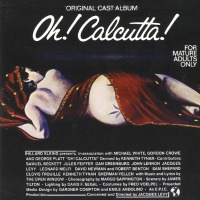 Original Broadway Cast, 1969 (Aidart/DRG) No stars; not recommended. Given that numerous scores by Cole Porter, Rodgers and Hart, and Jerome Kern remain unrecorded, the existence of this album — and its reissue on CD — is outrageous. Oh! Calcutta! was a good idea: an erotic revue written by such interesting and gifted people as Samuel Beckett, Jules Feiffer, John Lennon, and Sam Shepard. (Exactly who wrote what was revealed for the first time in Sherman Yellen’s excellent CD booklet notes.) But the show was developed by people with no musical theater experience or skill. In fact, it’s almost perversely unmusical in design and direction. Oh! Calcutta! famously played much of its marathon run to non-English-speaking tourists, who bought tickets not for the Beckett but because the cast members took off their clothes. The music recorded here isn’t theatrical at all; rather, it’s soft rock of no particular quality, like the background score of a movie. Professional actors-singers are featured in only three of the 12 cuts. The others are performed by composers Robert Dennis, Peter Schickele, and Stanley Walden, who — collectively known as The Open Window — make up the show’s band. Only one of the selections, “I Like the Look,” sounds like a theater song. I mention this because it’s the last track on the album, so you’ll probably never hear it. — David Wolf
Original Broadway Cast, 1969 (Aidart/DRG) No stars; not recommended. Given that numerous scores by Cole Porter, Rodgers and Hart, and Jerome Kern remain unrecorded, the existence of this album — and its reissue on CD — is outrageous. Oh! Calcutta! was a good idea: an erotic revue written by such interesting and gifted people as Samuel Beckett, Jules Feiffer, John Lennon, and Sam Shepard. (Exactly who wrote what was revealed for the first time in Sherman Yellen’s excellent CD booklet notes.) But the show was developed by people with no musical theater experience or skill. In fact, it’s almost perversely unmusical in design and direction. Oh! Calcutta! famously played much of its marathon run to non-English-speaking tourists, who bought tickets not for the Beckett but because the cast members took off their clothes. The music recorded here isn’t theatrical at all; rather, it’s soft rock of no particular quality, like the background score of a movie. Professional actors-singers are featured in only three of the 12 cuts. The others are performed by composers Robert Dennis, Peter Schickele, and Stanley Walden, who — collectively known as The Open Window — make up the show’s band. Only one of the selections, “I Like the Look,” sounds like a theater song. I mention this because it’s the last track on the album, so you’ll probably never hear it. — David Wolf
Oh, Brother!
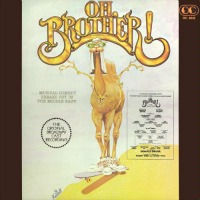 Original Broadway Cast, 1981 (Original Cast)
Original Broadway Cast, 1981 (Original Cast)  (3 / 5) It may have been pure folly for Donald Driver and Michael Valenti to invite comparison to The Boys from Syracuse with this modern musical retelling of Shakespeare’s The Comedy of Errors, reset in the Middle East. In fact, they were rewarded with a three-performance run. Still, there’s much to enjoy on this 49-minute cast album, starting with Valenti’s tuneful, singable melodies. Songs like “Everybody Calls Me by My Name,” “OPEC Maiden,” and “How Do You Want Me?” radiate goodwill. Driver’s lyrics are good-natured throughout. The songs are sung by an exceptionally rich-voiced young cast, with David Carroll, Judy Kaye, Mary Elizabeth Mastrantonio, and Larry Marshall giving their all. (Listen to Mastrantonio’s insane high note at the end of “That’s Him.” What planet is it from?) Not all of the material is golden, and the recording’s inclusion of several cut numbers — “Revolution,” “It’s a Man’s World,” “My World’s Comin’ Unwrapped” — only justifies their excision. But this show was honest and unpretentious, and its best qualities are nicely captured here. — Marc Miller
(3 / 5) It may have been pure folly for Donald Driver and Michael Valenti to invite comparison to The Boys from Syracuse with this modern musical retelling of Shakespeare’s The Comedy of Errors, reset in the Middle East. In fact, they were rewarded with a three-performance run. Still, there’s much to enjoy on this 49-minute cast album, starting with Valenti’s tuneful, singable melodies. Songs like “Everybody Calls Me by My Name,” “OPEC Maiden,” and “How Do You Want Me?” radiate goodwill. Driver’s lyrics are good-natured throughout. The songs are sung by an exceptionally rich-voiced young cast, with David Carroll, Judy Kaye, Mary Elizabeth Mastrantonio, and Larry Marshall giving their all. (Listen to Mastrantonio’s insane high note at the end of “That’s Him.” What planet is it from?) Not all of the material is golden, and the recording’s inclusion of several cut numbers — “Revolution,” “It’s a Man’s World,” “My World’s Comin’ Unwrapped” — only justifies their excision. But this show was honest and unpretentious, and its best qualities are nicely captured here. — Marc Miller
Of Thee I Sing
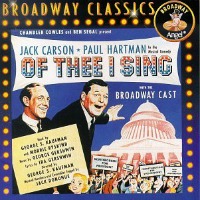 Broadway Cast, 1952 (Capitol/DRG/Angel)
Broadway Cast, 1952 (Capitol/DRG/Angel)  (3 / 5) The first musical to win a Pulitzer Prize, Of Thee I Sing (1931) is glorious. With music and lyrics by George and Ira Gershwin, and a book by George S. Kaufman and Morrie Ryskind, the show’s Jazz-Age score is exuberant and ingenious, and its skewering of American politics — particularly presidential campaigns — has, if anything, grown more relevant with the passing years. There is no cast album of the original production, but a 1952 revival, directed by Kaufman himself, yielded this recording. All the principal music is here, with revised orchestrations by Don Walker and a few rewritten lyrics by Ira Gershwin. Jack Carson may have seemed an unlikely choice for presidential candidate John P. Wintergreen, but he sings smoothly, exhibiting real warmth in “Who Cares?” His Mary, Betty Oakes, is bland. As his running mate Throttlebottom, Paul Hartman shares star billing but claims only one number. Jack Whiting’s Chief Justice has this song-and-dance man’s customary panache, while Lenore Lonergan as Diana Devereaux offers a truly bizarre performance; throaty and off key, she turns her vocal liabilities into character points and is quite funny and original. Maurice Levine conducts with energy and briskness. — Marc Miller
(3 / 5) The first musical to win a Pulitzer Prize, Of Thee I Sing (1931) is glorious. With music and lyrics by George and Ira Gershwin, and a book by George S. Kaufman and Morrie Ryskind, the show’s Jazz-Age score is exuberant and ingenious, and its skewering of American politics — particularly presidential campaigns — has, if anything, grown more relevant with the passing years. There is no cast album of the original production, but a 1952 revival, directed by Kaufman himself, yielded this recording. All the principal music is here, with revised orchestrations by Don Walker and a few rewritten lyrics by Ira Gershwin. Jack Carson may have seemed an unlikely choice for presidential candidate John P. Wintergreen, but he sings smoothly, exhibiting real warmth in “Who Cares?” His Mary, Betty Oakes, is bland. As his running mate Throttlebottom, Paul Hartman shares star billing but claims only one number. Jack Whiting’s Chief Justice has this song-and-dance man’s customary panache, while Lenore Lonergan as Diana Devereaux offers a truly bizarre performance; throaty and off key, she turns her vocal liabilities into character points and is quite funny and original. Maurice Levine conducts with energy and briskness. — Marc Miller
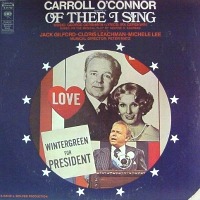 Television Cast, 1972 (Columbia/no CD)
Television Cast, 1972 (Columbia/no CD)  (1 / 5) In 1972, with “Archie Bunker for President” bumper stickers on every Ford Pinto and a theater-of-the-absurd presidential race in full swing, CBS trotted out Of Thee I Sing as a vehicle for some of its top sitcom stars. Carroll O’Connor played Wintergreen, and the network advertised, “Tonight: Archie Bunker becomes President!” O’Connor displays a serviceable Irish tenor and a nice way with a lyric. His Mary, Cloris Leachman, is similarly passable, and Michele Lee is a high-voltage Diana Devereaux. Otherwise, this hard-to-find LP is not worth the search. The score is garishly orchestrated and conducted, and the generous helping of laugh-track-supported dialogue that’s included confirms one’s suspicions that this is a fatally dumbed-down adaptation of the original show, replacing the smart Kaufman-Ryskind dialogue with exchanges better suited to Green Acres. — M.M.
(1 / 5) In 1972, with “Archie Bunker for President” bumper stickers on every Ford Pinto and a theater-of-the-absurd presidential race in full swing, CBS trotted out Of Thee I Sing as a vehicle for some of its top sitcom stars. Carroll O’Connor played Wintergreen, and the network advertised, “Tonight: Archie Bunker becomes President!” O’Connor displays a serviceable Irish tenor and a nice way with a lyric. His Mary, Cloris Leachman, is similarly passable, and Michele Lee is a high-voltage Diana Devereaux. Otherwise, this hard-to-find LP is not worth the search. The score is garishly orchestrated and conducted, and the generous helping of laugh-track-supported dialogue that’s included confirms one’s suspicions that this is a fatally dumbed-down adaptation of the original show, replacing the smart Kaufman-Ryskind dialogue with exchanges better suited to Green Acres. — M.M.
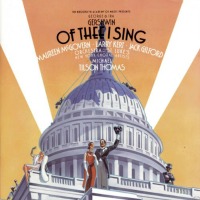 New York Concert Cast, 1987 (Sony, 2CDs; paired with Let ‘Em Eat Cake)
New York Concert Cast, 1987 (Sony, 2CDs; paired with Let ‘Em Eat Cake)  (2 / 5) Conducted by Gershwin scholar Michael Tilson Thomas and presented with great fanfare at the Brooklyn Academy of Music, a 1987 concert version of this gem of a show yielded a studio recording that is the most complete, most faithful Of Thee I Sing album available. Unfortunately, gleeful as the material is, the presentation is a little stiff. Larry Kert as Wintergreen is a fine singer, but here he exhibits all the personality of tofu. Maureen McGovern as Mary Wintergreen has more presence but less to do. Jack Gilford, who had played Throttlebottom on TV, is endearing — but, by this time, his voice had aged and weakened almost to a whisper. The best performance comes from Paige O’Hara, whose Diana Devereaux is vocally secure and dizzily funny. Yet even she over-punches her line readings; I smell a director who insisted on socking everything across the footlights, even in the recording studio. The digital stereo helps bring out the brassy orchestrations, and the notes in the accompanying booklet are authoritative. — M.M.
(2 / 5) Conducted by Gershwin scholar Michael Tilson Thomas and presented with great fanfare at the Brooklyn Academy of Music, a 1987 concert version of this gem of a show yielded a studio recording that is the most complete, most faithful Of Thee I Sing album available. Unfortunately, gleeful as the material is, the presentation is a little stiff. Larry Kert as Wintergreen is a fine singer, but here he exhibits all the personality of tofu. Maureen McGovern as Mary Wintergreen has more presence but less to do. Jack Gilford, who had played Throttlebottom on TV, is endearing — but, by this time, his voice had aged and weakened almost to a whisper. The best performance comes from Paige O’Hara, whose Diana Devereaux is vocally secure and dizzily funny. Yet even she over-punches her line readings; I smell a director who insisted on socking everything across the footlights, even in the recording studio. The digital stereo helps bring out the brassy orchestrations, and the notes in the accompanying booklet are authoritative. — M.M.
Nymph Errant
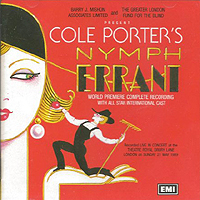 London Concert Cast, 1990 (EMI)
London Concert Cast, 1990 (EMI)  (5 / 5) Here is a rare find: a lost gem of a musical by Cole Porter that was produced in England but never on Broadway. This star-studded 1990 concert performance of the score was recorded live in London. The music represents Porter at his melodic best, and the lyrics are so sublimely witty that they warrant repeated listening for one to fully grasp the sharpness and comedic effect of his remarkable word play. So much of the album is laugh-out-loud funny that you’ll want to play many of the tracks several times to savor all the jokes. Among the luminaries in the cast are Alexis Smith, Larry Kert, Lisa Kirk, Kaye Ballard, Patrice Munsel, and Patricia Hodge, who offers a pristine rendition of that wonderful Porter paean to life and lust, “Experiment.” Other standout cuts are “The Cocotte,” “Solomon,” the hilarious throwaway number “Sweet Nudity,” and “How Could We Be Wrong?” The ballad “You’re Too Far Away” is lovely, but the most famous song in the score is the comic marathon “The Physician,” sharply performed by Lisa Kirk, who sails through the various choruses with glee and relish. For this performance, the entire score was reorchestrated by Jim Tyler and Michael Gibson; with Donald Pippin and David Firman at the twin pianos, the effect is gloriously authentic. Steven Hill’s vocal direction is impeccable, and the recording culminates in a bouncy choral reprise of “Experiment.” Those searching for a classic show score that’s fresh, naughty, and not over-familiar should seek out this album. — Gerard Alessandrini
(5 / 5) Here is a rare find: a lost gem of a musical by Cole Porter that was produced in England but never on Broadway. This star-studded 1990 concert performance of the score was recorded live in London. The music represents Porter at his melodic best, and the lyrics are so sublimely witty that they warrant repeated listening for one to fully grasp the sharpness and comedic effect of his remarkable word play. So much of the album is laugh-out-loud funny that you’ll want to play many of the tracks several times to savor all the jokes. Among the luminaries in the cast are Alexis Smith, Larry Kert, Lisa Kirk, Kaye Ballard, Patrice Munsel, and Patricia Hodge, who offers a pristine rendition of that wonderful Porter paean to life and lust, “Experiment.” Other standout cuts are “The Cocotte,” “Solomon,” the hilarious throwaway number “Sweet Nudity,” and “How Could We Be Wrong?” The ballad “You’re Too Far Away” is lovely, but the most famous song in the score is the comic marathon “The Physician,” sharply performed by Lisa Kirk, who sails through the various choruses with glee and relish. For this performance, the entire score was reorchestrated by Jim Tyler and Michael Gibson; with Donald Pippin and David Firman at the twin pianos, the effect is gloriously authentic. Steven Hill’s vocal direction is impeccable, and the recording culminates in a bouncy choral reprise of “Experiment.” Those searching for a classic show score that’s fresh, naughty, and not over-familiar should seek out this album. — Gerard Alessandrini
Nunsense II: The Second Coming
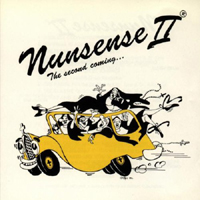 Original Off-Broadway Cast, 1993 (DRG)
Original Off-Broadway Cast, 1993 (DRG)  (2 / 5) Can anyone blame Iibrettist-composer-lyricist Dan Goggin for not wanting to mess with the formula that made Nunsense such a success? Of course not. Still, Nunsense II might have been more original. The score of the sequel does more than pay homage to its predecessor; again, there’s an upbeat opening chorus, a nun ballerina song, an understudy’s lament, a puppet-aided comedy number, a lengthy first-act finale dance, a gospel showstopper, and so on. Goggin even unapologetically quotes the previous show’s music in “The Biggest Still Ain’t the Best” and “Look Ma, I Made It.” The numbers that do incorporate new ideas — “We’re the Nuns to Come To” (in which the sisters consider starting a burial service), the envious “Padre Polka,” and the effervescent can-can “Yes, We Can” — are more fun than the retreads. Kathy Robinson, Mary Gillis, and Lyn Vaux are acceptable replacements for the originators of their roles, but returning cast members Christine Johnson and Semina De Laurentis shine most brightly, particularly in (respectively) the joyous “I Am Here to Stay” and the emotional “No One Cared Like You.” Michael Rice’s musical direction is, once again, just right. All in all, Nunsense II works best if you don’t know the original. — Matthew Murray
(2 / 5) Can anyone blame Iibrettist-composer-lyricist Dan Goggin for not wanting to mess with the formula that made Nunsense such a success? Of course not. Still, Nunsense II might have been more original. The score of the sequel does more than pay homage to its predecessor; again, there’s an upbeat opening chorus, a nun ballerina song, an understudy’s lament, a puppet-aided comedy number, a lengthy first-act finale dance, a gospel showstopper, and so on. Goggin even unapologetically quotes the previous show’s music in “The Biggest Still Ain’t the Best” and “Look Ma, I Made It.” The numbers that do incorporate new ideas — “We’re the Nuns to Come To” (in which the sisters consider starting a burial service), the envious “Padre Polka,” and the effervescent can-can “Yes, We Can” — are more fun than the retreads. Kathy Robinson, Mary Gillis, and Lyn Vaux are acceptable replacements for the originators of their roles, but returning cast members Christine Johnson and Semina De Laurentis shine most brightly, particularly in (respectively) the joyous “I Am Here to Stay” and the emotional “No One Cared Like You.” Michael Rice’s musical direction is, once again, just right. All in all, Nunsense II works best if you don’t know the original. — Matthew Murray
Nunsense
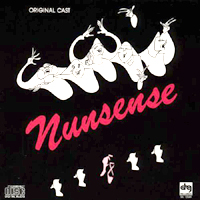 Original Off-Broadway Cast, 1986 (DRG)
Original Off-Broadway Cast, 1986 (DRG)  (3 / 5) This album preserves much of the straightforward charm of the show on which author Dan Goggin would eventually build a worldwide franchise. The story of Nunsense is very silly: Five nuns put on a revue to raise money to bury four sisters of their order who died from eating bad soup. With a score full of bounce and fun (under the musical direction of Michael Rice), the show capitalizes on religious themes and on the sisters’ showbiz proclivities in songs that range from the reflective “Growing Up Catholic” to the toe-tapping “Tackle That Temptation With a Time Step.” The story is told by plot numbers such as “We’ve Got to Clean Out the Freezer,” a reference to the place where the dead nuns’ bodies are being stored pre-burial. Character numbers such as “The Biggest Ain’t the Best,” all about humility, are tossed in for good measure. The cast is fine: Marilyn Farina as the reserved Reverend Mother Mary Cardelia; brassy Christine Johnson as Sister Robert Anne; sweet-voiced Suzi Winson as Sister Mary Leo; and the energetic Edwina Lewis, who, as Sister Mary Hubert, delivers the terrific gospel rave-up “Holier Than Thou.” Finally, there’s the multi-talented Semina De Laurentis singing legit soprano, a country-western ditty, and a duet with a puppet in her role of Sister Mary Amnesia, the forgetful nun whose search for her identity comprises the show’s subplot. There’s not much depth in Nunsense, but there’s plenty of good-natured ribbing of the Catholic Church and the women who devote their lives to it. — Matthew Murray
(3 / 5) This album preserves much of the straightforward charm of the show on which author Dan Goggin would eventually build a worldwide franchise. The story of Nunsense is very silly: Five nuns put on a revue to raise money to bury four sisters of their order who died from eating bad soup. With a score full of bounce and fun (under the musical direction of Michael Rice), the show capitalizes on religious themes and on the sisters’ showbiz proclivities in songs that range from the reflective “Growing Up Catholic” to the toe-tapping “Tackle That Temptation With a Time Step.” The story is told by plot numbers such as “We’ve Got to Clean Out the Freezer,” a reference to the place where the dead nuns’ bodies are being stored pre-burial. Character numbers such as “The Biggest Ain’t the Best,” all about humility, are tossed in for good measure. The cast is fine: Marilyn Farina as the reserved Reverend Mother Mary Cardelia; brassy Christine Johnson as Sister Robert Anne; sweet-voiced Suzi Winson as Sister Mary Leo; and the energetic Edwina Lewis, who, as Sister Mary Hubert, delivers the terrific gospel rave-up “Holier Than Thou.” Finally, there’s the multi-talented Semina De Laurentis singing legit soprano, a country-western ditty, and a duet with a puppet in her role of Sister Mary Amnesia, the forgetful nun whose search for her identity comprises the show’s subplot. There’s not much depth in Nunsense, but there’s plenty of good-natured ribbing of the Catholic Church and the women who devote their lives to it. — Matthew Murray
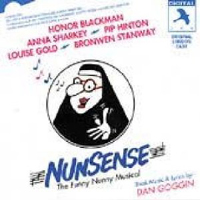 Original London Cast, 1987 (JAY/TER)
Original London Cast, 1987 (JAY/TER)  (3 / 5) A bit more complete than the Off-Broadway recording, this one includes the full dance music and vocal in “Benedicite,” the second-act “Dying Nun” ballet, and the brief “Gloria in Excelsis Deo.” In most other respects, the London cast album of Nunsense is on a par with the New York original; some of the singing is a bit more adventurous, but the performers’ British accents lend the score a slightly stodgier feel. The cast includes Honor Blackman, Anna Sharkey, Pip Hinton, Bronwen Stanway, and Louise Gold. All are competent. — M.M.
(3 / 5) A bit more complete than the Off-Broadway recording, this one includes the full dance music and vocal in “Benedicite,” the second-act “Dying Nun” ballet, and the brief “Gloria in Excelsis Deo.” In most other respects, the London cast album of Nunsense is on a par with the New York original; some of the singing is a bit more adventurous, but the performers’ British accents lend the score a slightly stodgier feel. The cast includes Honor Blackman, Anna Sharkey, Pip Hinton, Bronwen Stanway, and Louise Gold. All are competent. — M.M.

